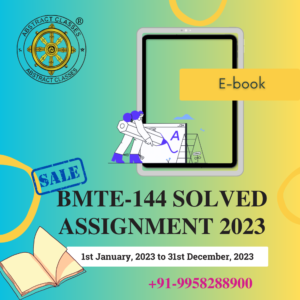₹51.00
Share with your Friends
Get the most comprehensive and accurate solution to the BSOC-133 assignment with our expert-written and verified BSOC-133 Solved Assignment 2023. This assignment covers all the questions with concepts of the BSOC-133 course and will help you score high grades in your examination. Our BSOC-133 Solved Assignment 2023 is a complete guide that includes step-by-step answers to all the questions and problems in the assignment, along with relevant examples and illustrations to make learning easier. This solution is written by experienced professionals who have a deep understanding of the subject and are well-versed in the latest course curriculum.
Our BSOC-133 Solved Assignment 2023 is designed to meet the requirements of IGNOU students and is available in a user-friendly format for easy access and use. The solution is available exclusively on our app and can be accessed from anywhere, anytime, on your Android device.
Don’t let the BSOC-133 assignment stress you out! Get the BSOC-133 Solved Assignment 2023 today and experience the ease of learning and improved grades.
- Our BSOC-133 Solved Assignment 2023 is 100% original and free from plagiarism, ensuring that you receive a unique and authentic solution that meets the highest quality standards.
- The solution is updated regularly to reflect any changes or updates in the course curriculum, ensuring that you receive the most current and accurate information.
- With our BSOC-133 Solved Assignment 2023, you can save time and effort in completing your assignment, allowing you to focus on other important aspects of your studies.
- Our team is available 24/7 to assist you with any questions or concerns you may have about the solution, ensuring that you receive the support you need to succeed.
- The BSOC-133 Solved Assignment 2023 is reasonably priced and offers excellent value for money, helping you achieve your academic goals without breaking the bank.
- By purchasing the BSOC-133 Solved Assignment 2023, you are investing in your academic success and taking the first step towards achieving your goals. Get your hands on the solution today and see the difference it can make in your studies!
IGNOU BSOC-133 Assignment Question Paper 2023
Get ahead in your IGNOU Course studies with confidence by reviewing the BSOC-133 assignment questions before buying the expert-written solution from our app. Quick Search Section in our app makes it easy to double-check the year and session validity of the IGNOU assignment solutions, ensuring that you avoid any confusion. Our aim is to provide you with the most accurate and up-to-date IGNOU assignment solutions , and our expert-written assignments are unmatched by any other website. So, before making your purchase, take a moment to review the BSOC-133 assignment questions and ensure they match your needs. With our attention to detail and expertise, you can trust that you’re getting the right IGNOU assignment solution for your specific needs.
Assignment I
Answer the following Descriptive Category Questions in about 500 words each. Each question carries 20 marks.
1. Compare and contrast Marx’s, Durkheim’s and Weber’s viewpoints on society, class and solidarity.
2. Discuss Marx’s perspective on division of labour.
Assignment II
Answer the following Middle Category Questions in about 250 words each. Each question carries 10 marks.
3. Discuss Émile Durkheim’s contribution to the sociology of religion.
4. What are the main characteristics of bureaucracy?
5. Explain Weber’s Theory of Social Action.
Assignment III
Answer the following Short Category Questions in about 100 words each. Each question carries 6 marks.
6. What is mechanical solidarity?
7. List the rules of observation of social facts.
8. What do you understand by is collective conscience?
9. Explain the concept of class.
10. Outline the laws of dialectic.
BSOC-133 Sample Solution 2023
Take a look at our sample solution of BSOC-133 Solved Assignment 2023 to get a feel for the top notch and accuracy of our IGNOU assignment solution. This sample solution is just one example of how we can help you with your IGNOU assignments, and we’re happy to present it as proof that we always produce high-quality work done by subject matter experts. Our assignments are solved by experts from multiple universities, unlike other sites that provide copied or stolen study materials. By doing so, we can guarantee that you will receive solutions that are both original and accurate, providing you with the knowledge you need to succeed academically. Don’t take our word for it; have a look at a sample of our BSOC-133 Solved Assignment 2023 now and see for yourself. You’ll have the advantage you need to excel in your IGNOU studies with our expert-written assignments.
Answer-1
Karl Marx, Emile Durkheim, and Max Weber were all prominent sociologists of the 19th and early 20th centuries who had distinct views on society, class, and solidarity.
Marx believed that society was divided into two classes: the bourgeoisie, or the owners of the means of production, and the proletariat, or the working class. He believed that class conflict was the driving force of social change, as the working class would eventually overthrow the bourgeoisie in a revolution and establish a classless society. Marx also believed that capitalist societies were inherently exploitative, as the bourgeoisie used the labor of the proletariat to generate profits for themselves.
Durkheim, on the other hand, focused on the concept of social solidarity and the role of social institutions in maintaining it. He believed that society was held together by shared values and beliefs, which he referred to as “collective consciousness.” Durkheim also believed that social solidarity was necessary for the functioning of society, as it provided a sense of unity and cohesion among individuals. He argued that social change could be brought about through the development of new forms of social solidarity, such as the rise of individualism in modern societies.
Weber, like Marx, also believed that class was a significant aspect of society, however, he saw it as being determined by an individual’s access to economic resources and power, not just their relationship to the means of production. He also believed that class was not the only important factor shaping society, but was rather one of many, including status, party and bureaucracy. For Weber, social change was driven by a variety of factors, including economic and technological developments, religious and cultural influences, and the actions of individuals and groups.
All three sociologists recognized the importance of social solidarity in maintaining societal stability, however, their views on how it is achieved differs. Marx believed that solidarity would come from the working class uniting against the bourgeoisie, while Durkheim saw it as stemming from shared values and beliefs. Weber, on the other hand, believed that social change could be brought about by a variety of factors, including the actions of individuals and groups.
Another important difference between the three sociologists is their views on the role of the state. Marx saw the state as a tool of the ruling class, used to maintain their power and exploit the working class. He believed that the state would eventually be abolished in a communist revolution. Durkheim, on the other hand, saw the state as a necessary institution for maintaining social order and solidarity. He believed that the state played an important role in enforcing shared values and beliefs and promoting cooperation among individuals. Weber, like Durkheim, recognized the importance of the state in maintaining social order, but also saw it as a source of bureaucracy and power struggles.
In conclusion, Marx, Durkheim, and Weber all had unique perspectives on society, class, and solidarity. Marx emphasized class conflict and the need for a revolution to create a classless society, Durkheim focused on the role of social institutions in maintaining social solidarity, and Weber emphasized the importance of multiple factors in shaping society. All of these sociologists contributed to our understanding of society and their work continues to be studied and debated today.
Frequently Asked Questions (FAQs)
You can access the Complete Solution through our app, which can be downloaded using this link:
Simply click “Install” to download and install the app, and then follow the instructions to purchase the required assignment solution. Currently, the app is only available for Android devices. We are working on making the app available for iOS in the future, but it is not currently available for iOS devices.
Yes, It is Complete Solution, a comprehensive solution to the assignments for IGNOU. Valid from January 1, 2023 to December 31, 2023.
Yes, the Complete Solution is aligned with the IGNOU requirements and has been solved accordingly.
Yes, the Complete Solution is guaranteed to be error-free.The solutions are thoroughly researched and verified by subject matter experts to ensure their accuracy.
As of now, you have access to the Complete Solution for a period of 6 months after the date of purchase, which is sufficient to complete the assignment. However, we can extend the access period upon request. You can access the solution anytime through our app.
The app provides complete solutions for all assignment questions. If you still need help, you can contact the support team for assistance at Whatsapp +91-9958288900
No, access to the educational materials is limited to one device only, where you have first logged in. Logging in on multiple devices is not allowed and may result in the revocation of access to the educational materials.
Payments can be made through various secure online payment methods available in the app.Your payment information is protected with industry-standard security measures to ensure its confidentiality and safety. You will receive a receipt for your payment through email or within the app, depending on your preference.
The instructions for formatting your assignments are detailed in the Assignment Booklet, which includes details on paper size, margins, precision, and submission requirements. It is important to strictly follow these instructions to facilitate evaluation and avoid delays.
Terms and Conditions
- The educational materials provided in the app are the sole property of the app owner and are protected by copyright laws.
- Reproduction, distribution, or sale of the educational materials without prior written consent from the app owner is strictly prohibited and may result in legal consequences.
- Any attempt to modify, alter, or use the educational materials for commercial purposes is strictly prohibited.
- The app owner reserves the right to revoke access to the educational materials at any time without notice for any violation of these terms and conditions.
- The app owner is not responsible for any damages or losses resulting from the use of the educational materials.
- The app owner reserves the right to modify these terms and conditions at any time without notice.
- By accessing and using the app, you agree to abide by these terms and conditions.
- Access to the educational materials is limited to one device only. Logging in to the app on multiple devices is not allowed and may result in the revocation of access to the educational materials.
Our educational materials are solely available on our website and application only. Users and students can report the dealing or selling of the copied version of our educational materials by any third party at our email address (abstract4math@gmail.com) or mobile no. (+91-9958288900).
In return, such users/students can expect free our educational materials/assignments and other benefits as a bonafide gesture which will be completely dependent upon our discretion.
Related products

IGNOU MEG-18 Solved Assignment 2022-2023 | MEG | American Poetry
₹101.00Please read the following points before ordering this IGNOU Assignment Solution.

IGNOU MEG-09 Solved Assignment 2022-2023 | MEG | Australian Literature
₹101.00Please read the following points before ordering this IGNOU Assignment Solution.

IGNOU MEG-08 Solved Assignment 2022-2023 | MEG | NEW LITERATURES IN ENGLISH
₹101.00Please read the following points before ordering this IGNOU Assignment Solution.
Categories: IGNOU Assignment Solution, MA MEG, MA MEG 2022-2023 Tags: "IGNOU, 2022-2023, American Literature, British Novel, British Poetry, English Literature, IGNOU MEG-08 Solved Assignment, Indian English Literature, Literary Criticism & Theory, MEG, MEG-08, New Literatures in English, Solved Assignment
IGNOU MST-002 Solved Assignment 2023 | PGDAST
₹351.00Access via our Android App Only
Please read the following points before ordering :
Categories: IGNOU Assignment Solution, PGDAST, PGDAST 2023 Tags: 2023 assignments, Descriptive Statistics assignment solution, Descriptive Statistics solved assignment, Expert-written, IGNOU assignments, IGNOU course materials, IGNOU distance learning, IGNOU MST-002, ignou pgdast assignment solution 2023, ignou pgdast solved assignment 2023, IGNOU study materials, IGNOU study resources., mst-002 assignment solution, mst-002 assignment solution 2023, mst-002 solved assignment, mst-002 solved assignment 2023, mst002 assignment solution, mst002 assignment solution 2023, mst002 solved assignment, mst002 solved assignment 2023, mst02 assignment solution, mst02 assignment solution 2023, mst02 solved assignment, mst02 solved assignment 2023, mst2 assignment solution, mst2 assignment solution 2023, mst2 solved assignment, mst2 solved assignment 2023, PGDAST, Solved assignments

IGNOU MSTE-004 Previous Year Paper Solution | PGDAST
₹365.00Solved Papers – Dec 2022 to Dec 2023 (Total 3 Papers)
Access via our Android App or any Web browser.
Please read the following points before ordering :

IGNOU MSTE-003 Previous Year Paper Solution | PGDAST
₹365.00Solved Papers – Dec 2022 to Dec 2023 (Total 3 Papers)
Access via our Android App or any Web browser.
Please read the following points before ordering :

IGNOU MSTE-002 Previous Year Paper Solution | PGDAST
₹365.00Solved Papers – June 2015 to Dec 2023 (Total 18 Papers)
Access via our Android App or any Web browser.
Please read the following points before ordering :

IGNOU MSTE-001 Previous Year Paper Solution | PGDAST
₹365.00Solved Papers – Dec 2015 to Dec 2023 (Total 17 Papers)
Access via our Android App or any Web browser.
Please read the following points before ordering :

IGNOU MST-004 Previous Year Paper Solution | PGDAST
₹365.00Solved Papers – June 2015 to Dec 2023 (Total 18 Papers)
Access via our Android App or any Web browser.
Please read the following points before ordering :

IGNOU MST-019 Solved Assignment 2024 | MSCAST | IGNOU
₹365.00Access via our Android App Only
Please read the following points before ordering :

IGNOU MST-018 Solved Assignment 2024 | MSCAST | IGNOU
₹365.00Access via our Android App Only
Please read the following points before ordering :

IGNOU MST-017 Solved Assignment 2024 | MSCAST | IGNOU
₹365.00Access via our Android App Only
Please read the following points before ordering :

IGNOU MST-016 Solved Assignment 2024 | MSCAST | IGNOU
₹365.00Access via our Android App Only
Please read the following points before ordering :

IGNOU MPH-005 Solved Assignment 2024 | MSCPH | IGNOU
₹365.00Access via our Android App Only
Please read the following points before ordering :

IGNOU MPH-004 Solved Assignment 2024 | MSCPH | IGNOU
₹365.00Access via our Android App Only
Please read the following points before ordering :

IGNOU MPH-003 Solved Assignment 2024 | MSCPH | IGNOU
₹365.00Access via our Android App Only
Please read the following points before ordering :

IGNOU MPH-002 Solved Assignment 2024 | MSCPH | IGNOU
₹365.00Access via our Android App Only
Please read the following points before ordering :

IGNOU MPH-001 Solved Assignment 2024 | MSCPH | IGNOU
₹365.00Access via our Android App Only
Please read the following points before ordering :

IGNOU BZYET-143 Solved Assignment 2024 | B.Sc. CBCS Zoology
₹49.00Please read the following points before ordering this IGNOU Assignment Solution.

IGNOU BZYET-141 Solved Assignment 2024 | B.Sc. CBCS Zoology
₹49.00Please read the following points before ordering this IGNOU Assignment Solution.

IGNOU BZYCT-137 Solved Assignment 2024 | B.Sc. CBCS Zoology
₹49.00Please read the following points before ordering this IGNOU Assignment Solution.

IGNOU BZYCT-135 Solved Assignment 2024 | B.Sc. CBCS Zoology
₹49.00Please read the following points before ordering this IGNOU Assignment Solution.

IGNOU MMT-007 Solved Assignment 2024 | M.Sc. MACS
₹365.00Access via our Android App Only
Please read the following points before ordering :

IGNOU MMT-005 Solved Assignment 2024 | M.Sc. MACS
₹365.00Access via our Android App Only
Please read the following points before ordering :

IGNOU MMT-004 Solved Assignment 2024 | M.Sc. MACS
₹365.00Access via our Android App Only
Please read the following points before ordering :

IGNOU MMT-002 Solved Assignment 2024 | M.Sc. MACS
₹365.00Access via our Android App Only
Please read the following points before ordering :

IGNOU MMT-001 Solved Assignment 2024 | M.Sc. MACS
₹365.00Access via our Android App Only
Please read the following points before ordering :

IGNOU MMT-008 Solved Assignment 2024 | M.Sc. MACS
₹365.00Access via our Android App Only
Please read the following points before ordering :

IGNOU MMTE-001 Solved Assignment 2024 | M.Sc. MACS
₹365.00Access via our Android App Only
Please read the following points before ordering :

IGNOU MMTE-002 Solved Assignment 2024 | M.Sc. MACS
₹365.00Access via our Android App Only
Please read the following points before ordering :

IGNOU MMT-009 Solved Assignment 2024 | M.Sc. MACS
₹365.00Access via our Android App Only
Please read the following points before ordering :

IGNOU MMTE-004 Solved Assignment 2024 | M.Sc. MACS
₹365.00Access via our Android App Only
Please read the following points before ordering :

IGNOU MMTE-003 Solved Assignment 2024 | M.Sc. MACS
₹365.00Access via our Android App Only
Please read the following points before ordering :

IGNOU MMT-006 Solved Assignment 2024 | M.Sc. MACS
₹365.00Access via our Android App Only
Please read the following points before ordering :

IGNOU MMT-003 Solved Assignment 2024 | M.Sc. MACS
₹365.00Access via our Android App Only
Please read the following points before ordering :

IGNOU BCHET-147 Solved Assignment 2024 | B.Sc. CBCS Chemistry
₹49.00Please read the following points before ordering this IGNOU Assignment Solution.

IGNOU BCHET-141 Solved Assignment 2024 | B.Sc. CBCS Chemistry
₹49.00Please read the following points before ordering this IGNOU Assignment Solution.

IGNOU BCHCT-137 Solved Assignment 2024 | B.Sc. CBCS Chemistry
₹49.00Please read the following points before ordering this IGNOU Assignment Solution.

IGNOU BCHCT-135 Solved Assignment 2024 | B.Sc. CBCS Chemistry
₹49.00Please read the following points before ordering this IGNOU Assignment Solution.

IGNOU BPHET-143 Solved Assignment 2024 | B.Sc (G) CBCS
₹101.00Please read the following points before ordering this IGNOU Assignment Solution.

IGNOU BPHET-141 Solved Assignment 2024 | B.Sc (G) CBCS
₹101.00Please read the following points before ordering this IGNOU Assignment Solution.

IGNOU BPHCT-137 Solved Assignment 2024 | B.Sc (G) CBCS
₹101.00Please read the following points before ordering this IGNOU Assignment Solution.

IGNOU BPHCT-135 Solved Assignment 2024 | B.Sc (G) CBCS
₹101.00Please read the following points before ordering this IGNOU Assignment Solution.

IGNOU BPHCT-133 Solved Assignment 2024 | B.Sc (G) CBCS
₹101.00Please read the following points before ordering this IGNOU Assignment Solution.

IGNOU BPHCT-131 Solved Assignment 2024 | B.Sc (G) CBCS
₹101.00Please read the following points before ordering this IGNOU Assignment Solution.

IGNOU BBYET-143 Solved Assignment 2024 | B.Sc. CBCS Botany
₹49.00Please read the following points before ordering this IGNOU Assignment Solution.

IGNOU BBYET-141 Solved Assignment 2024 | B.Sc. CBCS Botany
₹49.00Please read the following points before ordering this IGNOU Assignment Solution.

IGNOU BBYCT-137 Solved Assignment 2024 | B.Sc. CBCS Botany
₹49.00Please read the following points before ordering this IGNOU Assignment Solution.

IGNOU BBYCT-135 Solved Assignment 2024 | B.Sc. CBCS Botany
₹49.00Please read the following points before ordering this IGNOU Assignment Solution.

IGNOU BBYCT-133 Solved Assignment 2024 | B.Sc. CBCS Botany
₹49.00Please read the following points before ordering this IGNOU Assignment Solution.

IGNOU BBYCT-131 Solved Assignment 2024 | B.Sc. CBCS Botany
₹49.00Please read the following points before ordering this IGNOU Assignment Solution.

IGNOU BZYCT-133 Solved Assignment 2024 | B.Sc. CBCS Zoology
₹49.00Please read the following points before ordering this IGNOU Assignment Solution.

IGNOU BZYCT-131 Solved Assignment 2024 | B.Sc. CBCS Zoology
₹49.00Please read the following points before ordering this IGNOU Assignment Solution.

IGNOU BCHCT-133 Solved Assignment 2024 | B.Sc. CBCS Chemistry
₹49.00Please read the following points before ordering this IGNOU Assignment Solution.

IGNOU BCHCT-131 Solved Assignment 2024 | B.Sc. CBCS Chemistry
₹49.00Please read the following points before ordering this IGNOU Assignment Solution.

IGNOU BEGAE-182 Solved Assignment 2024 | CBCS
₹49.00Please read the following points before ordering this IGNOU Assignment Solution.

IGNOU BEVAE-181 Solved Assignment 2024 | B.Sc (G) CBCS AECC
₹49.00Please read the following points before ordering this IGNOU Assignment Solution.

IGNOU BMTC-132 Solved Assignment 2024 | B.Sc (G) CBCS
₹101.00Please read the following points before ordering this IGNOU Assignment Solution.

IGNOU BMTC-131 Solved Assignment 2024 | B.Sc (G) CBCS
₹101.00Please read the following points before ordering this IGNOU Assignment Solution.

IGNOU BMTC-133 Solved Assignment 2024 | B.Sc (G) CBCS
₹101.00Please read the following points before ordering this IGNOU Assignment Solution.

IGNOU BMTC-134 Solved Assignment 2024 | B.Sc (G) CBCS
₹101.00Please read the following points before ordering this IGNOU Assignment Solution.

IGNOU BMTE-144 Solved Assignment 2024 | B.Sc (G) CBCS
₹101.00Please read the following points before ordering this IGNOU Assignment Solution.

IGNOU BMTE-141 Solved Assignment 2024 | B.Sc (G) CBCS
₹101.00Please read the following points before ordering this IGNOU Assignment Solution.

IGNOU MSTE-004 Solved Assignment 2024 | PGDAST
₹351.00Access via our Android App Only
Please read the following points before ordering :

IGNOU MSTE-003 Solved Assignment 2024 | PGDAST
₹351.00Access via our Android App Only
Please read the following points before ordering :

IGNOU MSTE-002 Solved Assignment 2024 | PGDAST
₹351.00Access via our Android App Only
Please read the following points before ordering :

IGNOU MSTE-001 Solved Assignment 2024 | PGDAST
₹351.00Access via our Android App Only
Please read the following points before ordering :

IGNOU MST-005 Solved Assignment 2024 | PGDAST
₹351.00Access via our Android App Only
Please read the following points before ordering :

IGNOU MST-004 Solved Assignment 2024 | PGDAST
₹351.00Access via our Android App Only
Please read the following points before ordering :

IGNOU MST-003 Solved Assignment 2024 | PGDAST
₹351.00Access via our Android App Only
Please read the following points before ordering :

IGNOU MST-002 Solved Assignment 2024 | PGDAST
₹351.00Access via our Android App Only
Please read the following points before ordering :

IGNOU MST-001 Solved Assignment 2024 | PGDAST
₹351.00Access via our Android App Only
Please read the following points before ordering :

IGNOU MST-003 Previous Year Paper Solution | PGDAST
₹365.00Solved Papers – June 2015 to Dec 2023 (Total 18 Papers)
Access via our Android App or any Web browser.
Please read the following points before ordering :

IGNOU MST-005 Previous Year Paper Solution | PGDAST
₹365.00Solved Papers – Dec 2015 to Dec 2023 (Total 17 Papers)
Access via our Android App or any Web browser.
Please read the following points before ordering :

IGNOU MST-002 Previous Year Paper Solution | PGDAST
₹365.00Solved Papers – June 2015 to Dec 2023 (Total 18 Papers)
Access via our Android App or any Web browser.
Please read the following points before ordering :

IGNOU MMTE-001 Solved Assignment 2023 | M.Sc. MACS
₹365.00Access via our Android App Only
Please read the following points before ordering :

UPSC Previous Years Maths Optional Papers with Solution | Paper-02
₹1,095.00Available on our Android App as well.
Please read the following points before ordering :

UPSC Previous Years Maths Optional Papers with Solution | Paper-01
₹1,095.00Available on our Android App as well.
Please read the following points before ordering :

IGNOU MST-015 Solved Assignment 2023 | MSCAST
₹365.00Access via our Android App Only
Please read the following points before ordering :

IGNOU MST-014 Solved Assignment 2023 | MSCAST
₹365.00Access via our Android App Only
Please read the following points before ordering :

IGNOU MST-013 Solved Assignment 2023 | MSCAST
₹365.00Access via our Android App Only
Please read the following points before ordering :

IGNOU MST-012 Solved Assignment 2023 | MSCAST
₹365.00Access via our Android App Only
Please read the following points before ordering :

IGNOU MST-011 Solved Assignment 2023 | MSCAST
₹365.00Access via our Android App Only
Please read the following points before ordering :

IGNOU MMT-008 Solved Assignment 2023 | M.Sc. MACS
₹365.00Access via our Android App Only
Please read the following points before ordering :

IGNOU MMT-006 Solved Assignment 2023 | M.Sc. MACS
₹365.00Access via our Android App Only
Please read the following points before ordering :

IGNOU MMT-003 Solved Assignment 2023 | M.Sc. MACS
₹365.00Access via our Android App Only
Please read the following points before ordering :

IGNOU MST-001 Previous Year Paper Solution | PGDAST
₹365.00Solved Papers – June 2015 to Dec 2023 (Total 18 Papers)
Access via our Android App or any Web browser.
Please read the following points before ordering :

IGNOU MEV-019 Solved Assignment 2023-2024 | MSCENV
₹101.00Access via our Android App Only
Please read the following points before ordering :

IGNOU MEV-018 Solved Assignment 2023-2024 | MSCENV
₹101.00Access via our Android App Only
Please read the following points before ordering :

IGNOU MEV-017 Solved Assignment 2023-2024 | MSCENV
₹101.00Access via our Android App Only
Please read the following points before ordering :

IGNOU MEV-016 Solved Assignment 2023-2024 | MSCENV
₹101.00Access via our Android App Only
Please read the following points before ordering :

IGNOU MEV-015 Solved Assignment 2023-2024 | MSCENV
₹101.00Access via our Android App Only
Please read the following points before ordering :

IGNOU MEV-014 Solved Assignment 2023-2024 | MSCENV
₹101.00Access via our Android App Only
Please read the following points before ordering :

IGNOU MEV-013 Solved Assignment 2023-2024 | MSCENV
₹101.00Access via our Android App Only
Please read the following points before ordering :

IGNOU MEV-012 Solved Assignment 2023-2024 | MSCENV
₹101.00Access via our Android App Only
Please read the following points before ordering :

IGNOU MEV-011 Solved Assignment 2023-2024 | MSCENV
₹101.00Access via our Android App Only
Please read the following points before ordering :

IGNOU BCHET-149 Solved Assignment 2023 | B.Sc (G) CBCS
₹101.00Please read the following points before ordering this IGNOU Assignment Solution.

IGNOU BCHET-147 Solved Assignment 2023 | B.Sc (G) CBCS
₹101.00Please read the following points before ordering this IGNOU Assignment Solution.

IGNOU BCHET-141 Solved Assignment 2023 | B.Sc (G) CBCS
₹101.00Please read the following points before ordering this IGNOU Assignment Solution.

IGNOU BCHCT-137 Solved Assignment 2023 | B.Sc (G) CBCS
₹101.00Please read the following points before ordering this IGNOU Assignment Solution.

IGNOU BCHCT-135 Solved Assignment 2023 | B.Sc (G) CBCS
₹101.00Please read the following points before ordering this IGNOU Assignment Solution.

IGNOU BPHET-143 Solved Assignment 2023 | B.Sc. CBCS
₹101.00Access via our Android App Only
Please read the following points before ordering :

IGNOU BPHET-141 Solved Assignment 2023 | B.Sc. CBCS
₹101.00Access via our Android App Only
Please read the following points before ordering :

IGNOU BPHCT-137 Solved Assignment 2023 | B.Sc. CBCS
₹101.00Access via our Android App Only
Please read the following points before ordering :

IGNOU BPHCT-135 Solved Assignment 2023 | B.Sc. CBCS
₹101.00Access via our Android App Only
Please read the following points before ordering :

IGNOU BMTE-144 Solved Assignment 2023 | B.Sc (G) CBCS
₹101.00Please read the following points before ordering this IGNOU Assignment Solution.

IGNOU MEG-19 Solved Assignment 2023-2024 | MA MEG
₹101.00Access via our Android App Only
Please read the following points before ordering :

IGNOU MEG-18 Solved Assignment 2023-2024 | MA MEG
₹101.00Access via our Android App Only
Please read the following points before ordering :

IGNOU MEG-17 Solved Assignment 2023-2024 | MA MEG
₹101.00Access via our Android App Only
Please read the following points before ordering :

IGNOU MEG-16 Solved Assignment 2023-2024 | MA MEG
₹101.00Access via our Android App Only
Please read the following points before ordering :

IGNOU MEG-15 Solved Assignment 2023-2024 | MA MEG
₹101.00Access via our Android App Only
Please read the following points before ordering :

IGNOU MEG-14 Solved Assignment 2023-2024 | MA MEG
₹101.00Access via our Android App Only
Please read the following points before ordering :

IGNOU MEG-13 Solved Assignment 2023-2024 | MA MEG
₹101.00Access via our Android App Only
Please read the following points before ordering :

IGNOU MEG-12 Solved Assignment 2023-2024 | MA MEG
₹101.00Access via our Android App Only
Please read the following points before ordering :

IGNOU MEG-11 Solved Assignment 2023-2024 | MA MEG
₹101.00Access via our Android App Only
Please read the following points before ordering :

IGNOU MEG-10 Solved Assignment 2023-2024 | MA MEG
₹101.00Access via our Android App Only
Please read the following points before ordering :

IGNOU MEG-09 Solved Assignment 2023-2024 | MA MEG
₹101.00Access via our Android App Only
Please read the following points before ordering :

IGNOU MEG-08 Solved Assignment 2023-2024 | MA MEG
₹101.00Access via our Android App Only
Please read the following points before ordering :

IGNOU MEG-07 Solved Assignment 2023-2024 | MA MEG
₹101.00Access via our Android App Only
Please read the following points before ordering :

IGNOU MEG-06 Solved Assignment 2023-2024 | MA MEG
₹101.00Access via our Android App Only
Please read the following points before ordering :

IGNOU MEG-05 Solved Assignment 2023-2024 | MA MEG
₹101.00Access via our Android App Only
Please read the following points before ordering :

IGNOU MEG-04 Solved Assignment 2023-2024 | MA MEG
₹101.00Access via our Android App Only
Please read the following points before ordering :

IGNOU MEG-03 Solved Assignment 2023-2024 | MA MEG
₹101.00Access via our Android App Only
Please read the following points before ordering :

IGNOU MEG-02 Solved Assignment 2023-2024 | MA MEG
₹101.00Access via our Android App Only
Please read the following points before ordering :

IGNOU MEG-01 Solved Assignment 2023-2024 | MA MEG
₹101.00Access via our Android App Only
Please read the following points before ordering :

IGNOU MMT-007 Solved Assignment 2023 | M.Sc. MACS
₹351.00Access via our Android App Only
Please read the following points before ordering :

IGNOU MMT-005 Solved Assignment 2023 | M.Sc. MACS
₹351.00Access via our Android App Only
Please read the following points before ordering :

IGNOU MMT-004 Solved Assignment 2023 | M.Sc. MACS
₹351.00Access via our Android App Only
Please read the following points before ordering :

IGNOU MMT-002 Solved Assignment 2023 | M.Sc. MACS
₹351.00Access via our Android App Only
Please read the following points before ordering :

IGNOU MSTL-002 Solved Assignment 2023 | PGDAST
₹401.00Access via our Android App Only
Please read the following points before ordering :

IGNOU MSTL-001 Solved Assignment 2023 | PGDAST
₹401.00Access via our Android App Only
Please read the following points before ordering :

IGNOU PHE-06 Solved Assignment 2023
₹201.00Please read the following points before ordering this IGNOU Assignment Solution.

IGNOU BCHCT-133 Solved Assignment 2023 | B.Sc (G) CBCS
₹101.00Please read the following points before ordering this IGNOU Assignment Solution.

IGNOU BCHCT-131 Solved Assignment 2023 | B.Sc (G) CBCS
₹101.00Please read the following points before ordering this IGNOU Assignment Solution.

IGNOU BPHCT-133 Solved Assignment 2023 | B.Sc (G) CBCS
₹101.00Please read the following points before ordering this IGNOU Assignment Solution.

IGNOU BPHCT-131 Solved Assignment 2023 | B.Sc (G) CBCS
₹101.00Please read the following points before ordering this IGNOU Assignment Solution.

IGNOU BMTE-141 Solved Assignment 2023 | B.Sc (G) CBCS
₹101.00Please read the following points before ordering this IGNOU Assignment Solution.

IGNOU BMTC-134 Solved Assignment 2023 | B.Sc (G) CBCS
₹101.00Please read the following points before ordering this IGNOU Assignment Solution.

IGNOU BMTC-133 Solved Assignment 2023 | B.Sc (G) CBCS
₹101.00Please read the following points before ordering this IGNOU Assignment Solution.

IGNOU BMTC-132 Solved Assignment 2023 | B.Sc (G) CBCS
₹101.00Please read the following points before ordering this IGNOU Assignment Solution.

IGNOU BMTC-131 Solved Assignment 2023 | B.Sc (G) CBCS
₹101.00Please read the following points before ordering this IGNOU Assignment Solution.

IGNOU MTE-13 Solved Assignment 2023 | MTE
₹251.00Please read the following points before ordering this IGNOU Assignment Solution.

IGNOU MTE-12 Solved Assignment 2023 | MTE
₹251.00Please read the following points before ordering this IGNOU Assignment Solution.

IGNOU MTE-11 Solved Assignment 2023 | MTE
₹251.00Please read the following points before ordering this IGNOU Assignment Solution.

IGNOU MTE-10 Solved Assignment 2023 | MTE
₹201.00Please read the following points before ordering this IGNOU Assignment Solution.

IGNOU MTE-09 Solved Assignment 2023 | MTE
₹201.00Please read the following points before ordering this IGNOU Assignment Solution.

IGNOU MTE-08 Solved Assignment 2023 | MTE
₹201.00Please read the following points before ordering this IGNOU Assignment Solution.

IGNOU MTE-07 Solved Assignment 2023 | MTE
₹201.00Please read the following points before ordering this IGNOU Assignment Solution.

IGNOU MTE-06 Solved Assignment 2023 | MTE
₹151.00Please read the following points before ordering this IGNOU Assignment Solution.

IGNOU MTE-05 Solved Assignment 2023 | MTE
₹151.00Please read the following points before ordering this IGNOU Assignment Solution.

IGNOU MSTE-004 Solved Assignment 2023 | PGDAST
₹351.00Access via our Android App Only
Please read the following points before ordering :

IGNOU MSTE-003 Solved Assignment 2023 | PGDAST
₹351.00Access via our Android App Only
Please read the following points before ordering :

IGNOU MSTE-002 Solved Assignment 2023 | PGDAST
₹351.00Access via our Android App Only
Please read the following points before ordering :

IGNOU MMT-001 Solved Assignment 2023 | MA MACS
₹351.00Access via our Android App Only
Please read the following points before ordering :

IGNOU MSTE-001 Solved Assignment 2023 | PGDAST
₹351.00Access via our Android App Only
Please read the following points before ordering :

IGNOU MST-005 Solved Assignment 2023 | PGDAST
₹351.00Access via our Android App Only
Please read the following points before ordering :

IGNOU BEVAE-181 Solved Assignment 2022-2023 | BSCG/ BAG/ BCOMG | AECC ON ENVIRONMENTAL STUDIES
₹51.00Please read the following points before ordering this IGNOU Assignment Solution.

IGNOU BEGC-133 Assignment Solution 2022-2023 | BAG | BRITISH LITERATURE
₹51.00Please read the following points before ordering this IGNOU Assignment Solution.

IGNOU BEGC-134 Assignment Solution 2022-2023 | BAG | Reading the Novel
₹51.00Please read the following points before ordering this IGNOU Assignment Solution.

IGNOU BEGLA-137 Assignment Solution 2022-2023 | BAG | Language through Literature
₹51.00Please read the following points before ordering this IGNOU Assignment Solution.

IGNOU BEGLA-138 Assignment Solution 2022-2023 | BAG | Reading & Speaking Skills
₹51.00Please read the following points before ordering this IGNOU Assignment Solution.

IGNOU BEGS-183 Assignment Solution 2022-2023 | BAG | WRITING AND STUDY SKILLS
₹51.00Please read the following points before ordering this IGNOU Assignment Solution.

IGNOU BSOC – 133 Solved Assignment 2022-2023 | BAG | SOCIOLOGICAL THEORIES
₹51.00Please read the following points before ordering this IGNOU Assignment Solution.

IGNOU BSOC – 134 Solved Assignment 2022-2023 | B.A.G | METHODS OF SOCIOLOGICAL ENQUIRY
₹51.00Please read the following points before ordering this IGNOU Assignment Solution.

IGNOU BCOS – 184 Solved Assignment 2022-2023 | B.Com | E-COMMERCE
₹51.00Please read the following points before ordering this IGNOU Assignment Solution.

IGNOU MPC-006 Solved Assignment 2022-2023 | MAPC | STATISTICS IN PSYCHOLOGY
₹101.00Please read the following points before ordering this IGNOU Assignment Solution.

IGNOU MPC-005 Solved Assignment 2022-2023 | MAPC | Research Methods
₹101.00Please read the following points before ordering this IGNOU Assignment Solution.

IGNOU MPC-004 Solved Assignment 2022-2023 | MAPC | ADVANCED SOCIAL PSYCHOLOGY
₹101.00Please read the following points before ordering this IGNOU Assignment Solution.

IGNOU MPC-003 Solved Assignment 2022-2023 | MAPC | PERSONALITY: THEORIES AND ASSESSMENT
₹101.00Please read the following points before ordering this IGNOU Assignment Solution.

IGNOU MPC-002 Solved Assignment 2022-2023 | MAPC | LIFE SPAN PSYCHOLOGY
₹101.00Please read the following points before ordering this IGNOU Assignment Solution.

IGNOU MPC-001 Solved Assignment 2022-2023 | MAPC | Cognitive Psychology, Learning and Memory
₹101.00Please read the following points before ordering this IGNOU Assignment Solution.

IGNOU MEG-19 Solved Assignment 2022-2023 | MEG | THE AUSTRALIAN NOVEL
₹101.00Please read the following points before ordering this IGNOU Assignment Solution.

IGNOU MEG-18 Solved Assignment 2022-2023 | MEG | American Poetry
₹101.00Please read the following points before ordering this IGNOU Assignment Solution.

IGNOU MEG-17 Solved Assignment 2022-2023 | MEG | American Drama
₹101.00Please read the following points before ordering this IGNOU Assignment Solution.

IGNOU MEG-16 Solved Assignment 2022-2023 | MEG | Indian Folk Literature
₹101.00Please read the following points before ordering this IGNOU Assignment Solution.

IGNOU MEG-15 Solved Assignment 2022-2023 | MEG | Comparative Literature: Theory and Practice
₹101.00Please read the following points before ordering this IGNOU Assignment Solution.

IGNOU MEG-14 Solved Assignment 2022-2023 | MEG | Contemporary Indian Literature in English Translation
₹101.00Please read the following points before ordering this IGNOU Assignment Solution.

IGNOU MEG-13 Solved Assignment 2022-2023 | MEG | WRITINGS FROM THE MARGINS
₹101.00Please read the following points before ordering this IGNOU Assignment Solution.

IGNOU MEG-12 Solved Assignment 2022-2023 | MEG | A Survey Course in 20th Century Canadian Literature
₹101.00Please read the following points before ordering this IGNOU Assignment Solution.

IGNOU MEG-11 Solved Assignment 2022-2023 | MEG | AMERICAN NOVEL
₹101.00Please read the following points before ordering this IGNOU Assignment Solution.

IGNOU MEG-10 Solved Assignment 2022-2023 | MEG | ENGLISH STUDIES IN INDIA
₹101.00Please read the following points before ordering this IGNOU Assignment Solution.

IGNOU MEG-09 Solved Assignment 2022-2023 | MEG | Australian Literature
₹101.00Please read the following points before ordering this IGNOU Assignment Solution.

IGNOU MEG-08 Solved Assignment 2022-2023 | MEG | NEW LITERATURES IN ENGLISH
₹101.00Please read the following points before ordering this IGNOU Assignment Solution.

IGNOU MEG-07 Solved Assignment 2022-2023 | MEG | INDIAN ENGLISH LITERATURE
₹101.00Please read the following points before ordering this IGNOU Assignment Solution.

IGNOU MEG-06 Solved Assignment 2022-2023 | MEG | AMERICAN LITERATURE
₹101.00Please read the following points before ordering this IGNOU Assignment Solution.

IGNOU MEG-05 Solved Assignment 2022-2023 | MEG | LITERARY CRITICISM & THEORY
₹101.00Please read the following points before ordering this IGNOU Assignment Solution.

IGNOU MEG-04 Solved Assignment 2022-2023 | MEG | ASPECTS OF LANGUAGE
₹101.00Please read the following points before ordering this IGNOU Assignment Solution.

IGNOU MEG-03 Solved Assignment 2022-2023 | MEG | British Novel
₹101.00Please read the following points before ordering this IGNOU Assignment Solution.

IGNOU MEG-02 Solved Assignment 2022-2023 | MEG | British Drama
₹101.00Please read the following points before ordering this IGNOU Assignment Solution.

IGNOU MEG-01 Solved Assignment 2022-2023 | MEG | British Poetry
₹101.00Please read the following points before ordering this IGNOU Assignment Solution.

IGNOU MST-004 Solved Assignment 2023 | PGDAST
₹351.00Access via our Android App Only
Please read the following points before ordering :

IGNOU MST-003 Solved Assignment 2023 | PGDAST
₹351.00Access via our Android App Only
Please read the following points before ordering :

IGNOU MST-002 Solved Assignment 2023 | PGDAST
₹351.00Access via our Android App Only
Please read the following points before ordering :

IGNOU MST-001 Solved Assignment 2023 | PGDAST
₹351.00Access via our Android App Only
Please read the following points before ordering :

Stop and Take a Second
₹110.00Donec pede justo, fringilla vel, aliquet nec, vulputate eget, arcu. In enim justo, rhoncus ut, imperdiet a, venenatis vitae, justo.
There are many variations of passages of Lorem Ipsum available, but the majority have suffered alteration in some form, by injected humour, or randomised words which don’t look even slightly.

Running From Me
₹70.00Donec pede justo, fringilla vel, aliquet nec, vulputate eget, arcu. In enim justo, rhoncus ut, imperdiet a, venenatis vitae, justo.
There are many variations of passages of Lorem Ipsum available, but the majority have suffered alteration in some form, by injected humour, or randomised words which don’t look even slightly.

Red Side Book
₹300.00Donec pede justo, fringilla vel, aliquet nec, vulputate eget, arcu. In enim justo, rhoncus ut, imperdiet a, venenatis vitae, justo.
There are many variations of passages of Lorem Ipsum available, but the majority have suffered alteration in some form, by injected humour, or randomised words which don’t look even slightly.

Real Life Fairytale
₹250.00Donec pede justo, fringilla vel, aliquet nec, vulputate eget, arcu. In enim justo, rhoncus ut, imperdiet a, venenatis vitae, justo.
There are many variations of passages of Lorem Ipsum available, but the majority have suffered alteration in some form, by injected humour, or randomised words which don’t look even slightly.

Note Book Mockup
₹200.00Donec pede justo, fringilla vel, aliquet nec, vulputate eget, arcu. In enim justo, rhoncus ut, imperdiet a, venenatis vitae, justo.
There are many variations of passages of Lorem Ipsum available, but the majority have suffered alteration in some form, by injected humour, or randomised words which don’t look even slightly.

Motivational Book Cover
This story, dazzling in its powerful simplicity and soul-stirring wisdom, is about an Andalusian shepherd boy named Santiago who travels from his homeland in Spain to the Egyptian desert in search of a treasure buried near the Pyramids. Lorem ipsum dolor sit amet, consectetur adipiscing elit, sed do eiusmod tempor incididunt ut labore et. Lorem ipsum dolor sit amet, consectetur adipiscing elit, sed do eiusmod tempor incididunt etc.
1 in stock

Book Cover Softcover
This story, dazzling in its powerful simplicity and soul-stirring wisdom, is about an Andalusian shepherd boy named Santiago who travels from his homeland in Spain to the Egyptian desert in search of a treasure buried near the Pyramids. Lorem ipsum dolor sit amet, consectetur adipiscing elit, sed do eiusmod tempor incididunt ut labore et. Lorem ipsum dolor sit amet, consectetur adipiscing elit, sed do eiusmod tempor incididunt etc.
4 in stock

IGNOU MSTE-004 Previous Year Paper Solution | PGDAST
₹365.00Solved Papers – Dec 2022 to Dec 2023 (Total 3 Papers)
Access via our Android App or any Web browser.
Please read the following points before ordering :

IGNOU MSTE-003 Previous Year Paper Solution | PGDAST
₹365.00Solved Papers – Dec 2022 to Dec 2023 (Total 3 Papers)
Access via our Android App or any Web browser.
Please read the following points before ordering :

IGNOU MSTE-002 Previous Year Paper Solution | PGDAST
₹365.00Solved Papers – June 2015 to Dec 2023 (Total 18 Papers)
Access via our Android App or any Web browser.
Please read the following points before ordering :

IGNOU MSTE-001 Previous Year Paper Solution | PGDAST
₹365.00Solved Papers – Dec 2015 to Dec 2023 (Total 17 Papers)
Access via our Android App or any Web browser.
Please read the following points before ordering :

IGNOU MST-004 Previous Year Paper Solution | PGDAST
₹365.00Solved Papers – June 2015 to Dec 2023 (Total 18 Papers)
Access via our Android App or any Web browser.
Please read the following points before ordering :

IGNOU MST-019 Solved Assignment 2024 | MSCAST | IGNOU
₹365.00Access via our Android App Only
Please read the following points before ordering :

IGNOU MST-018 Solved Assignment 2024 | MSCAST | IGNOU
₹365.00Access via our Android App Only
Please read the following points before ordering :

IGNOU MST-017 Solved Assignment 2024 | MSCAST | IGNOU
₹365.00Access via our Android App Only
Please read the following points before ordering :

IGNOU MST-016 Solved Assignment 2024 | MSCAST | IGNOU
₹365.00Access via our Android App Only
Please read the following points before ordering :

IGNOU MPH-005 Solved Assignment 2024 | MSCPH | IGNOU
₹365.00Access via our Android App Only
Please read the following points before ordering :

IGNOU MPH-004 Solved Assignment 2024 | MSCPH | IGNOU
₹365.00Access via our Android App Only
Please read the following points before ordering :

IGNOU MPH-003 Solved Assignment 2024 | MSCPH | IGNOU
₹365.00Access via our Android App Only
Please read the following points before ordering :

IGNOU MPH-002 Solved Assignment 2024 | MSCPH | IGNOU
₹365.00Access via our Android App Only
Please read the following points before ordering :

IGNOU MPH-001 Solved Assignment 2024 | MSCPH | IGNOU
₹365.00Access via our Android App Only
Please read the following points before ordering :

IGNOU BZYET-143 Solved Assignment 2024 | B.Sc. CBCS Zoology
₹49.00Please read the following points before ordering this IGNOU Assignment Solution.

IGNOU BZYET-141 Solved Assignment 2024 | B.Sc. CBCS Zoology
₹49.00Please read the following points before ordering this IGNOU Assignment Solution.

IGNOU BZYCT-137 Solved Assignment 2024 | B.Sc. CBCS Zoology
₹49.00Please read the following points before ordering this IGNOU Assignment Solution.

IGNOU BZYCT-135 Solved Assignment 2024 | B.Sc. CBCS Zoology
₹49.00Please read the following points before ordering this IGNOU Assignment Solution.

IGNOU MMT-007 Solved Assignment 2024 | M.Sc. MACS
₹365.00Access via our Android App Only
Please read the following points before ordering :

IGNOU MMT-005 Solved Assignment 2024 | M.Sc. MACS
₹365.00Access via our Android App Only
Please read the following points before ordering :

IGNOU MMT-004 Solved Assignment 2024 | M.Sc. MACS
₹365.00Access via our Android App Only
Please read the following points before ordering :

IGNOU MMT-002 Solved Assignment 2024 | M.Sc. MACS
₹365.00Access via our Android App Only
Please read the following points before ordering :

IGNOU MMT-001 Solved Assignment 2024 | M.Sc. MACS
₹365.00Access via our Android App Only
Please read the following points before ordering :

IGNOU MMT-008 Solved Assignment 2024 | M.Sc. MACS
₹365.00Access via our Android App Only
Please read the following points before ordering :

IGNOU MMTE-001 Solved Assignment 2024 | M.Sc. MACS
₹365.00Access via our Android App Only
Please read the following points before ordering :

IGNOU MMTE-002 Solved Assignment 2024 | M.Sc. MACS
₹365.00Access via our Android App Only
Please read the following points before ordering :

IGNOU MMT-009 Solved Assignment 2024 | M.Sc. MACS
₹365.00Access via our Android App Only
Please read the following points before ordering :

IGNOU MMTE-004 Solved Assignment 2024 | M.Sc. MACS
₹365.00Access via our Android App Only
Please read the following points before ordering :

IGNOU MMTE-003 Solved Assignment 2024 | M.Sc. MACS
₹365.00Access via our Android App Only
Please read the following points before ordering :

IGNOU MMT-006 Solved Assignment 2024 | M.Sc. MACS
₹365.00Access via our Android App Only
Please read the following points before ordering :

IGNOU MMT-003 Solved Assignment 2024 | M.Sc. MACS
₹365.00Access via our Android App Only
Please read the following points before ordering :

IGNOU BCHET-147 Solved Assignment 2024 | B.Sc. CBCS Chemistry
₹49.00Please read the following points before ordering this IGNOU Assignment Solution.

IGNOU BCHET-141 Solved Assignment 2024 | B.Sc. CBCS Chemistry
₹49.00Please read the following points before ordering this IGNOU Assignment Solution.

IGNOU BCHCT-137 Solved Assignment 2024 | B.Sc. CBCS Chemistry
₹49.00Please read the following points before ordering this IGNOU Assignment Solution.

IGNOU BCHCT-135 Solved Assignment 2024 | B.Sc. CBCS Chemistry
₹49.00Please read the following points before ordering this IGNOU Assignment Solution.

IGNOU BPHET-143 Solved Assignment 2024 | B.Sc (G) CBCS
₹101.00Please read the following points before ordering this IGNOU Assignment Solution.

IGNOU BPHET-141 Solved Assignment 2024 | B.Sc (G) CBCS
₹101.00Please read the following points before ordering this IGNOU Assignment Solution.

IGNOU BPHCT-137 Solved Assignment 2024 | B.Sc (G) CBCS
₹101.00Please read the following points before ordering this IGNOU Assignment Solution.

IGNOU BPHCT-135 Solved Assignment 2024 | B.Sc (G) CBCS
₹101.00Please read the following points before ordering this IGNOU Assignment Solution.

IGNOU BPHCT-133 Solved Assignment 2024 | B.Sc (G) CBCS
₹101.00Please read the following points before ordering this IGNOU Assignment Solution.

IGNOU BPHCT-131 Solved Assignment 2024 | B.Sc (G) CBCS
₹101.00Please read the following points before ordering this IGNOU Assignment Solution.

IGNOU BBYET-143 Solved Assignment 2024 | B.Sc. CBCS Botany
₹49.00Please read the following points before ordering this IGNOU Assignment Solution.

IGNOU BBYET-141 Solved Assignment 2024 | B.Sc. CBCS Botany
₹49.00Please read the following points before ordering this IGNOU Assignment Solution.

IGNOU BBYCT-137 Solved Assignment 2024 | B.Sc. CBCS Botany
₹49.00Please read the following points before ordering this IGNOU Assignment Solution.

IGNOU BBYCT-135 Solved Assignment 2024 | B.Sc. CBCS Botany
₹49.00Please read the following points before ordering this IGNOU Assignment Solution.

IGNOU BBYCT-133 Solved Assignment 2024 | B.Sc. CBCS Botany
₹49.00Please read the following points before ordering this IGNOU Assignment Solution.

IGNOU BBYCT-131 Solved Assignment 2024 | B.Sc. CBCS Botany
₹49.00Please read the following points before ordering this IGNOU Assignment Solution.

IGNOU BZYCT-133 Solved Assignment 2024 | B.Sc. CBCS Zoology
₹49.00Please read the following points before ordering this IGNOU Assignment Solution.

IGNOU BZYCT-131 Solved Assignment 2024 | B.Sc. CBCS Zoology
₹49.00Please read the following points before ordering this IGNOU Assignment Solution.

IGNOU BCHCT-133 Solved Assignment 2024 | B.Sc. CBCS Chemistry
₹49.00Please read the following points before ordering this IGNOU Assignment Solution.

IGNOU BCHCT-131 Solved Assignment 2024 | B.Sc. CBCS Chemistry
₹49.00Please read the following points before ordering this IGNOU Assignment Solution.

IGNOU BEGAE-182 Solved Assignment 2024 | CBCS
₹49.00Please read the following points before ordering this IGNOU Assignment Solution.

IGNOU BEVAE-181 Solved Assignment 2024 | B.Sc (G) CBCS AECC
₹49.00Please read the following points before ordering this IGNOU Assignment Solution.

IGNOU BMTC-132 Solved Assignment 2024 | B.Sc (G) CBCS
₹101.00Please read the following points before ordering this IGNOU Assignment Solution.

IGNOU BMTC-131 Solved Assignment 2024 | B.Sc (G) CBCS
₹101.00Please read the following points before ordering this IGNOU Assignment Solution.

IGNOU BMTC-133 Solved Assignment 2024 | B.Sc (G) CBCS
₹101.00Please read the following points before ordering this IGNOU Assignment Solution.

IGNOU BMTC-134 Solved Assignment 2024 | B.Sc (G) CBCS
₹101.00Please read the following points before ordering this IGNOU Assignment Solution.

IGNOU BMTE-144 Solved Assignment 2024 | B.Sc (G) CBCS
₹101.00Please read the following points before ordering this IGNOU Assignment Solution.

IGNOU BMTE-141 Solved Assignment 2024 | B.Sc (G) CBCS
₹101.00Please read the following points before ordering this IGNOU Assignment Solution.

IGNOU MSTE-004 Solved Assignment 2024 | PGDAST
₹351.00Access via our Android App Only
Please read the following points before ordering :

IGNOU MSTE-003 Solved Assignment 2024 | PGDAST
₹351.00Access via our Android App Only
Please read the following points before ordering :

IGNOU MSTE-002 Solved Assignment 2024 | PGDAST
₹351.00Access via our Android App Only
Please read the following points before ordering :

IGNOU MSTE-001 Solved Assignment 2024 | PGDAST
₹351.00Access via our Android App Only
Please read the following points before ordering :

IGNOU MST-005 Solved Assignment 2024 | PGDAST
₹351.00Access via our Android App Only
Please read the following points before ordering :

IGNOU MST-004 Solved Assignment 2024 | PGDAST
₹351.00Access via our Android App Only
Please read the following points before ordering :

IGNOU MST-003 Solved Assignment 2024 | PGDAST
₹351.00Access via our Android App Only
Please read the following points before ordering :

IGNOU MST-002 Solved Assignment 2024 | PGDAST
₹351.00Access via our Android App Only
Please read the following points before ordering :

IGNOU MST-001 Solved Assignment 2024 | PGDAST
₹351.00Access via our Android App Only
Please read the following points before ordering :

IGNOU MST-003 Previous Year Paper Solution | PGDAST
₹365.00Solved Papers – June 2015 to Dec 2023 (Total 18 Papers)
Access via our Android App or any Web browser.
Please read the following points before ordering :

IGNOU MST-005 Previous Year Paper Solution | PGDAST
₹365.00Solved Papers – Dec 2015 to Dec 2023 (Total 17 Papers)
Access via our Android App or any Web browser.
Please read the following points before ordering :

IGNOU MST-002 Previous Year Paper Solution | PGDAST
₹365.00Solved Papers – June 2015 to Dec 2023 (Total 18 Papers)
Access via our Android App or any Web browser.
Please read the following points before ordering :

IGNOU MMTE-001 Solved Assignment 2023 | M.Sc. MACS
₹365.00Access via our Android App Only
Please read the following points before ordering :

UPSC Previous Years Maths Optional Papers with Solution | Paper-02
₹1,095.00Available on our Android App as well.
Please read the following points before ordering :

UPSC Previous Years Maths Optional Papers with Solution | Paper-01
₹1,095.00Available on our Android App as well.
Please read the following points before ordering :

IGNOU MST-015 Solved Assignment 2023 | MSCAST
₹365.00Access via our Android App Only
Please read the following points before ordering :

IGNOU MST-014 Solved Assignment 2023 | MSCAST
₹365.00Access via our Android App Only
Please read the following points before ordering :

IGNOU MST-013 Solved Assignment 2023 | MSCAST
₹365.00Access via our Android App Only
Please read the following points before ordering :

IGNOU MST-012 Solved Assignment 2023 | MSCAST
₹365.00Access via our Android App Only
Please read the following points before ordering :

IGNOU MST-011 Solved Assignment 2023 | MSCAST
₹365.00Access via our Android App Only
Please read the following points before ordering :

IGNOU MMT-008 Solved Assignment 2023 | M.Sc. MACS
₹365.00Access via our Android App Only
Please read the following points before ordering :

IGNOU MMT-006 Solved Assignment 2023 | M.Sc. MACS
₹365.00Access via our Android App Only
Please read the following points before ordering :

IGNOU MMT-003 Solved Assignment 2023 | M.Sc. MACS
₹365.00Access via our Android App Only
Please read the following points before ordering :

IGNOU MST-001 Previous Year Paper Solution | PGDAST
₹365.00Solved Papers – June 2015 to Dec 2023 (Total 18 Papers)
Access via our Android App or any Web browser.
Please read the following points before ordering :

IGNOU MEV-019 Solved Assignment 2023-2024 | MSCENV
₹101.00Access via our Android App Only
Please read the following points before ordering :

IGNOU MEV-018 Solved Assignment 2023-2024 | MSCENV
₹101.00Access via our Android App Only
Please read the following points before ordering :

IGNOU MEV-017 Solved Assignment 2023-2024 | MSCENV
₹101.00Access via our Android App Only
Please read the following points before ordering :

IGNOU MEV-016 Solved Assignment 2023-2024 | MSCENV
₹101.00Access via our Android App Only
Please read the following points before ordering :

IGNOU MEV-015 Solved Assignment 2023-2024 | MSCENV
₹101.00Access via our Android App Only
Please read the following points before ordering :

IGNOU MEV-014 Solved Assignment 2023-2024 | MSCENV
₹101.00Access via our Android App Only
Please read the following points before ordering :

IGNOU MEV-013 Solved Assignment 2023-2024 | MSCENV
₹101.00Access via our Android App Only
Please read the following points before ordering :

IGNOU MEV-012 Solved Assignment 2023-2024 | MSCENV
₹101.00Access via our Android App Only
Please read the following points before ordering :

IGNOU MEV-011 Solved Assignment 2023-2024 | MSCENV
₹101.00Access via our Android App Only
Please read the following points before ordering :

IGNOU BCHET-149 Solved Assignment 2023 | B.Sc (G) CBCS
₹101.00Please read the following points before ordering this IGNOU Assignment Solution.

IGNOU BCHET-147 Solved Assignment 2023 | B.Sc (G) CBCS
₹101.00Please read the following points before ordering this IGNOU Assignment Solution.

IGNOU BCHET-141 Solved Assignment 2023 | B.Sc (G) CBCS
₹101.00Please read the following points before ordering this IGNOU Assignment Solution.

IGNOU BCHCT-137 Solved Assignment 2023 | B.Sc (G) CBCS
₹101.00Please read the following points before ordering this IGNOU Assignment Solution.

IGNOU BCHCT-135 Solved Assignment 2023 | B.Sc (G) CBCS
₹101.00Please read the following points before ordering this IGNOU Assignment Solution.

IGNOU BPHET-143 Solved Assignment 2023 | B.Sc. CBCS
₹101.00Access via our Android App Only
Please read the following points before ordering :

IGNOU BPHET-141 Solved Assignment 2023 | B.Sc. CBCS
₹101.00Access via our Android App Only
Please read the following points before ordering :

IGNOU BPHCT-137 Solved Assignment 2023 | B.Sc. CBCS
₹101.00Access via our Android App Only
Please read the following points before ordering :

IGNOU BPHCT-135 Solved Assignment 2023 | B.Sc. CBCS
₹101.00Access via our Android App Only
Please read the following points before ordering :

IGNOU BMTE-144 Solved Assignment 2023 | B.Sc (G) CBCS
₹101.00Please read the following points before ordering this IGNOU Assignment Solution.

IGNOU MEG-19 Solved Assignment 2023-2024 | MA MEG
₹101.00Access via our Android App Only
Please read the following points before ordering :

IGNOU MEG-18 Solved Assignment 2023-2024 | MA MEG
₹101.00Access via our Android App Only
Please read the following points before ordering :

IGNOU MEG-17 Solved Assignment 2023-2024 | MA MEG
₹101.00Access via our Android App Only
Please read the following points before ordering :

IGNOU MEG-16 Solved Assignment 2023-2024 | MA MEG
₹101.00Access via our Android App Only
Please read the following points before ordering :

IGNOU MEG-15 Solved Assignment 2023-2024 | MA MEG
₹101.00Access via our Android App Only
Please read the following points before ordering :

IGNOU MEG-14 Solved Assignment 2023-2024 | MA MEG
₹101.00Access via our Android App Only
Please read the following points before ordering :

IGNOU MEG-13 Solved Assignment 2023-2024 | MA MEG
₹101.00Access via our Android App Only
Please read the following points before ordering :

IGNOU MEG-12 Solved Assignment 2023-2024 | MA MEG
₹101.00Access via our Android App Only
Please read the following points before ordering :

IGNOU MEG-11 Solved Assignment 2023-2024 | MA MEG
₹101.00Access via our Android App Only
Please read the following points before ordering :

IGNOU MEG-10 Solved Assignment 2023-2024 | MA MEG
₹101.00Access via our Android App Only
Please read the following points before ordering :

IGNOU MEG-09 Solved Assignment 2023-2024 | MA MEG
₹101.00Access via our Android App Only
Please read the following points before ordering :

IGNOU MEG-08 Solved Assignment 2023-2024 | MA MEG
₹101.00Access via our Android App Only
Please read the following points before ordering :

IGNOU MEG-07 Solved Assignment 2023-2024 | MA MEG
₹101.00Access via our Android App Only
Please read the following points before ordering :

IGNOU MEG-06 Solved Assignment 2023-2024 | MA MEG
₹101.00Access via our Android App Only
Please read the following points before ordering :

IGNOU MEG-05 Solved Assignment 2023-2024 | MA MEG
₹101.00Access via our Android App Only
Please read the following points before ordering :

IGNOU MEG-04 Solved Assignment 2023-2024 | MA MEG
₹101.00Access via our Android App Only
Please read the following points before ordering :

IGNOU MEG-03 Solved Assignment 2023-2024 | MA MEG
₹101.00Access via our Android App Only
Please read the following points before ordering :

IGNOU MEG-02 Solved Assignment 2023-2024 | MA MEG
₹101.00Access via our Android App Only
Please read the following points before ordering :

IGNOU MEG-01 Solved Assignment 2023-2024 | MA MEG
₹101.00Access via our Android App Only
Please read the following points before ordering :

IGNOU MMT-007 Solved Assignment 2023 | M.Sc. MACS
₹351.00Access via our Android App Only
Please read the following points before ordering :

IGNOU MMT-005 Solved Assignment 2023 | M.Sc. MACS
₹351.00Access via our Android App Only
Please read the following points before ordering :

IGNOU MMT-004 Solved Assignment 2023 | M.Sc. MACS
₹351.00Access via our Android App Only
Please read the following points before ordering :

IGNOU MMT-002 Solved Assignment 2023 | M.Sc. MACS
₹351.00Access via our Android App Only
Please read the following points before ordering :

IGNOU MSTL-002 Solved Assignment 2023 | PGDAST
₹401.00Access via our Android App Only
Please read the following points before ordering :

IGNOU MSTL-001 Solved Assignment 2023 | PGDAST
₹401.00Access via our Android App Only
Please read the following points before ordering :

IGNOU PHE-06 Solved Assignment 2023
₹201.00Please read the following points before ordering this IGNOU Assignment Solution.

IGNOU BCHCT-133 Solved Assignment 2023 | B.Sc (G) CBCS
₹101.00Please read the following points before ordering this IGNOU Assignment Solution.

IGNOU BCHCT-131 Solved Assignment 2023 | B.Sc (G) CBCS
₹101.00Please read the following points before ordering this IGNOU Assignment Solution.

IGNOU BPHCT-133 Solved Assignment 2023 | B.Sc (G) CBCS
₹101.00Please read the following points before ordering this IGNOU Assignment Solution.

IGNOU BPHCT-131 Solved Assignment 2023 | B.Sc (G) CBCS
₹101.00Please read the following points before ordering this IGNOU Assignment Solution.

IGNOU BMTE-141 Solved Assignment 2023 | B.Sc (G) CBCS
₹101.00Please read the following points before ordering this IGNOU Assignment Solution.

IGNOU BMTC-134 Solved Assignment 2023 | B.Sc (G) CBCS
₹101.00Please read the following points before ordering this IGNOU Assignment Solution.

IGNOU BMTC-133 Solved Assignment 2023 | B.Sc (G) CBCS
₹101.00Please read the following points before ordering this IGNOU Assignment Solution.

IGNOU BMTC-132 Solved Assignment 2023 | B.Sc (G) CBCS
₹101.00Please read the following points before ordering this IGNOU Assignment Solution.

IGNOU BMTC-131 Solved Assignment 2023 | B.Sc (G) CBCS
₹101.00Please read the following points before ordering this IGNOU Assignment Solution.

IGNOU MTE-13 Solved Assignment 2023 | MTE
₹251.00Please read the following points before ordering this IGNOU Assignment Solution.

IGNOU MTE-12 Solved Assignment 2023 | MTE
₹251.00Please read the following points before ordering this IGNOU Assignment Solution.

IGNOU MTE-11 Solved Assignment 2023 | MTE
₹251.00Please read the following points before ordering this IGNOU Assignment Solution.

IGNOU MTE-10 Solved Assignment 2023 | MTE
₹201.00Please read the following points before ordering this IGNOU Assignment Solution.

IGNOU MTE-09 Solved Assignment 2023 | MTE
₹201.00Please read the following points before ordering this IGNOU Assignment Solution.

IGNOU MTE-08 Solved Assignment 2023 | MTE
₹201.00Please read the following points before ordering this IGNOU Assignment Solution.

IGNOU MTE-07 Solved Assignment 2023 | MTE
₹201.00Please read the following points before ordering this IGNOU Assignment Solution.

IGNOU MTE-06 Solved Assignment 2023 | MTE
₹151.00Please read the following points before ordering this IGNOU Assignment Solution.

IGNOU MTE-05 Solved Assignment 2023 | MTE
₹151.00Please read the following points before ordering this IGNOU Assignment Solution.

IGNOU MSTE-004 Solved Assignment 2023 | PGDAST
₹351.00Access via our Android App Only
Please read the following points before ordering :

IGNOU MSTE-003 Solved Assignment 2023 | PGDAST
₹351.00Access via our Android App Only
Please read the following points before ordering :

IGNOU MSTE-002 Solved Assignment 2023 | PGDAST
₹351.00Access via our Android App Only
Please read the following points before ordering :

IGNOU MMT-001 Solved Assignment 2023 | MA MACS
₹351.00Access via our Android App Only
Please read the following points before ordering :

IGNOU MSTE-001 Solved Assignment 2023 | PGDAST
₹351.00Access via our Android App Only
Please read the following points before ordering :

IGNOU MST-005 Solved Assignment 2023 | PGDAST
₹351.00Access via our Android App Only
Please read the following points before ordering :

IGNOU BEVAE-181 Solved Assignment 2022-2023 | BSCG/ BAG/ BCOMG | AECC ON ENVIRONMENTAL STUDIES
₹51.00Please read the following points before ordering this IGNOU Assignment Solution.

IGNOU BEGC-133 Assignment Solution 2022-2023 | BAG | BRITISH LITERATURE
₹51.00Please read the following points before ordering this IGNOU Assignment Solution.

IGNOU BEGC-134 Assignment Solution 2022-2023 | BAG | Reading the Novel
₹51.00Please read the following points before ordering this IGNOU Assignment Solution.

IGNOU BEGLA-137 Assignment Solution 2022-2023 | BAG | Language through Literature
₹51.00Please read the following points before ordering this IGNOU Assignment Solution.

IGNOU BEGLA-138 Assignment Solution 2022-2023 | BAG | Reading & Speaking Skills
₹51.00Please read the following points before ordering this IGNOU Assignment Solution.

IGNOU BEGS-183 Assignment Solution 2022-2023 | BAG | WRITING AND STUDY SKILLS
₹51.00Please read the following points before ordering this IGNOU Assignment Solution.

IGNOU BSOC – 133 Solved Assignment 2022-2023 | BAG | SOCIOLOGICAL THEORIES
₹51.00Please read the following points before ordering this IGNOU Assignment Solution.

IGNOU BSOC – 134 Solved Assignment 2022-2023 | B.A.G | METHODS OF SOCIOLOGICAL ENQUIRY
₹51.00Please read the following points before ordering this IGNOU Assignment Solution.

IGNOU BCOS – 184 Solved Assignment 2022-2023 | B.Com | E-COMMERCE
₹51.00Please read the following points before ordering this IGNOU Assignment Solution.

IGNOU MPC-006 Solved Assignment 2022-2023 | MAPC | STATISTICS IN PSYCHOLOGY
₹101.00Please read the following points before ordering this IGNOU Assignment Solution.

IGNOU MPC-005 Solved Assignment 2022-2023 | MAPC | Research Methods
₹101.00Please read the following points before ordering this IGNOU Assignment Solution.

IGNOU MPC-004 Solved Assignment 2022-2023 | MAPC | ADVANCED SOCIAL PSYCHOLOGY
₹101.00Please read the following points before ordering this IGNOU Assignment Solution.

IGNOU MPC-003 Solved Assignment 2022-2023 | MAPC | PERSONALITY: THEORIES AND ASSESSMENT
₹101.00Please read the following points before ordering this IGNOU Assignment Solution.

IGNOU MPC-002 Solved Assignment 2022-2023 | MAPC | LIFE SPAN PSYCHOLOGY
₹101.00Please read the following points before ordering this IGNOU Assignment Solution.

IGNOU MPC-001 Solved Assignment 2022-2023 | MAPC | Cognitive Psychology, Learning and Memory
₹101.00Please read the following points before ordering this IGNOU Assignment Solution.

IGNOU MEG-19 Solved Assignment 2022-2023 | MEG | THE AUSTRALIAN NOVEL
₹101.00Please read the following points before ordering this IGNOU Assignment Solution.

IGNOU MEG-18 Solved Assignment 2022-2023 | MEG | American Poetry
₹101.00Please read the following points before ordering this IGNOU Assignment Solution.

IGNOU MEG-17 Solved Assignment 2022-2023 | MEG | American Drama
₹101.00Please read the following points before ordering this IGNOU Assignment Solution.

IGNOU MEG-16 Solved Assignment 2022-2023 | MEG | Indian Folk Literature
₹101.00Please read the following points before ordering this IGNOU Assignment Solution.

IGNOU MEG-15 Solved Assignment 2022-2023 | MEG | Comparative Literature: Theory and Practice
₹101.00Please read the following points before ordering this IGNOU Assignment Solution.

IGNOU MEG-14 Solved Assignment 2022-2023 | MEG | Contemporary Indian Literature in English Translation
₹101.00Please read the following points before ordering this IGNOU Assignment Solution.

IGNOU MEG-13 Solved Assignment 2022-2023 | MEG | WRITINGS FROM THE MARGINS
₹101.00Please read the following points before ordering this IGNOU Assignment Solution.

IGNOU MEG-12 Solved Assignment 2022-2023 | MEG | A Survey Course in 20th Century Canadian Literature
₹101.00Please read the following points before ordering this IGNOU Assignment Solution.

IGNOU MEG-11 Solved Assignment 2022-2023 | MEG | AMERICAN NOVEL
₹101.00Please read the following points before ordering this IGNOU Assignment Solution.

IGNOU MEG-10 Solved Assignment 2022-2023 | MEG | ENGLISH STUDIES IN INDIA
₹101.00Please read the following points before ordering this IGNOU Assignment Solution.

IGNOU MEG-09 Solved Assignment 2022-2023 | MEG | Australian Literature
₹101.00Please read the following points before ordering this IGNOU Assignment Solution.

IGNOU MEG-08 Solved Assignment 2022-2023 | MEG | NEW LITERATURES IN ENGLISH
₹101.00Please read the following points before ordering this IGNOU Assignment Solution.

IGNOU MEG-07 Solved Assignment 2022-2023 | MEG | INDIAN ENGLISH LITERATURE
₹101.00Please read the following points before ordering this IGNOU Assignment Solution.

IGNOU MEG-06 Solved Assignment 2022-2023 | MEG | AMERICAN LITERATURE
₹101.00Please read the following points before ordering this IGNOU Assignment Solution.

IGNOU MEG-05 Solved Assignment 2022-2023 | MEG | LITERARY CRITICISM & THEORY
₹101.00Please read the following points before ordering this IGNOU Assignment Solution.

IGNOU MEG-04 Solved Assignment 2022-2023 | MEG | ASPECTS OF LANGUAGE
₹101.00Please read the following points before ordering this IGNOU Assignment Solution.

IGNOU MEG-03 Solved Assignment 2022-2023 | MEG | British Novel
₹101.00Please read the following points before ordering this IGNOU Assignment Solution.

IGNOU MEG-02 Solved Assignment 2022-2023 | MEG | British Drama
₹101.00Please read the following points before ordering this IGNOU Assignment Solution.

IGNOU MEG-01 Solved Assignment 2022-2023 | MEG | British Poetry
₹101.00Please read the following points before ordering this IGNOU Assignment Solution.

IGNOU MST-004 Solved Assignment 2023 | PGDAST
₹351.00Access via our Android App Only
Please read the following points before ordering :

IGNOU MST-003 Solved Assignment 2023 | PGDAST
₹351.00Access via our Android App Only
Please read the following points before ordering :

IGNOU MST-002 Solved Assignment 2023 | PGDAST
₹351.00Access via our Android App Only
Please read the following points before ordering :

IGNOU MST-001 Solved Assignment 2023 | PGDAST
₹351.00Access via our Android App Only
Please read the following points before ordering :

Stop and Take a Second
₹110.00Donec pede justo, fringilla vel, aliquet nec, vulputate eget, arcu. In enim justo, rhoncus ut, imperdiet a, venenatis vitae, justo.
There are many variations of passages of Lorem Ipsum available, but the majority have suffered alteration in some form, by injected humour, or randomised words which don’t look even slightly.

Running From Me
₹70.00Donec pede justo, fringilla vel, aliquet nec, vulputate eget, arcu. In enim justo, rhoncus ut, imperdiet a, venenatis vitae, justo.
There are many variations of passages of Lorem Ipsum available, but the majority have suffered alteration in some form, by injected humour, or randomised words which don’t look even slightly.

Red Side Book
₹300.00Donec pede justo, fringilla vel, aliquet nec, vulputate eget, arcu. In enim justo, rhoncus ut, imperdiet a, venenatis vitae, justo.
There are many variations of passages of Lorem Ipsum available, but the majority have suffered alteration in some form, by injected humour, or randomised words which don’t look even slightly.

Real Life Fairytale
₹250.00Donec pede justo, fringilla vel, aliquet nec, vulputate eget, arcu. In enim justo, rhoncus ut, imperdiet a, venenatis vitae, justo.
There are many variations of passages of Lorem Ipsum available, but the majority have suffered alteration in some form, by injected humour, or randomised words which don’t look even slightly.

Note Book Mockup
₹200.00Donec pede justo, fringilla vel, aliquet nec, vulputate eget, arcu. In enim justo, rhoncus ut, imperdiet a, venenatis vitae, justo.
There are many variations of passages of Lorem Ipsum available, but the majority have suffered alteration in some form, by injected humour, or randomised words which don’t look even slightly.

Motivational Book Cover
This story, dazzling in its powerful simplicity and soul-stirring wisdom, is about an Andalusian shepherd boy named Santiago who travels from his homeland in Spain to the Egyptian desert in search of a treasure buried near the Pyramids. Lorem ipsum dolor sit amet, consectetur adipiscing elit, sed do eiusmod tempor incididunt ut labore et. Lorem ipsum dolor sit amet, consectetur adipiscing elit, sed do eiusmod tempor incididunt etc.
1 in stock

Book Cover Softcover
This story, dazzling in its powerful simplicity and soul-stirring wisdom, is about an Andalusian shepherd boy named Santiago who travels from his homeland in Spain to the Egyptian desert in search of a treasure buried near the Pyramids. Lorem ipsum dolor sit amet, consectetur adipiscing elit, sed do eiusmod tempor incididunt ut labore et. Lorem ipsum dolor sit amet, consectetur adipiscing elit, sed do eiusmod tempor incididunt etc.
4 in stock

IGNOU MSTE-004 Previous Year Paper Solution | PGDAST
₹365.00Solved Papers – Dec 2022 to Dec 2023 (Total 3 Papers)
Access via our Android App or any Web browser.
Please read the following points before ordering :

IGNOU MSTE-003 Previous Year Paper Solution | PGDAST
₹365.00Solved Papers – Dec 2022 to Dec 2023 (Total 3 Papers)
Access via our Android App or any Web browser.
Please read the following points before ordering :

IGNOU MSTE-002 Previous Year Paper Solution | PGDAST
₹365.00Solved Papers – June 2015 to Dec 2023 (Total 18 Papers)
Access via our Android App or any Web browser.
Please read the following points before ordering :

IGNOU MSTE-001 Previous Year Paper Solution | PGDAST
₹365.00Solved Papers – Dec 2015 to Dec 2023 (Total 17 Papers)
Access via our Android App or any Web browser.
Please read the following points before ordering :

IGNOU MST-004 Previous Year Paper Solution | PGDAST
₹365.00Solved Papers – June 2015 to Dec 2023 (Total 18 Papers)
Access via our Android App or any Web browser.
Please read the following points before ordering :

IGNOU MST-019 Solved Assignment 2024 | MSCAST | IGNOU
₹365.00Access via our Android App Only
Please read the following points before ordering :

IGNOU MST-018 Solved Assignment 2024 | MSCAST | IGNOU
₹365.00Access via our Android App Only
Please read the following points before ordering :

IGNOU MST-017 Solved Assignment 2024 | MSCAST | IGNOU
₹365.00Access via our Android App Only
Please read the following points before ordering :

IGNOU MST-016 Solved Assignment 2024 | MSCAST | IGNOU
₹365.00Access via our Android App Only
Please read the following points before ordering :

IGNOU MPH-005 Solved Assignment 2024 | MSCPH | IGNOU
₹365.00Access via our Android App Only
Please read the following points before ordering :

IGNOU MPH-004 Solved Assignment 2024 | MSCPH | IGNOU
₹365.00Access via our Android App Only
Please read the following points before ordering :

IGNOU MPH-003 Solved Assignment 2024 | MSCPH | IGNOU
₹365.00Access via our Android App Only
Please read the following points before ordering :

IGNOU MPH-002 Solved Assignment 2024 | MSCPH | IGNOU
₹365.00Access via our Android App Only
Please read the following points before ordering :

IGNOU MPH-001 Solved Assignment 2024 | MSCPH | IGNOU
₹365.00Access via our Android App Only
Please read the following points before ordering :

IGNOU BZYET-143 Solved Assignment 2024 | B.Sc. CBCS Zoology
₹49.00Please read the following points before ordering this IGNOU Assignment Solution.

IGNOU BZYET-141 Solved Assignment 2024 | B.Sc. CBCS Zoology
₹49.00Please read the following points before ordering this IGNOU Assignment Solution.

IGNOU BZYCT-137 Solved Assignment 2024 | B.Sc. CBCS Zoology
₹49.00Please read the following points before ordering this IGNOU Assignment Solution.

IGNOU BZYCT-135 Solved Assignment 2024 | B.Sc. CBCS Zoology
₹49.00Please read the following points before ordering this IGNOU Assignment Solution.

IGNOU MMT-007 Solved Assignment 2024 | M.Sc. MACS
₹365.00Access via our Android App Only
Please read the following points before ordering :

IGNOU MMT-005 Solved Assignment 2024 | M.Sc. MACS
₹365.00Access via our Android App Only
Please read the following points before ordering :

IGNOU MMT-004 Solved Assignment 2024 | M.Sc. MACS
₹365.00Access via our Android App Only
Please read the following points before ordering :

IGNOU MMT-002 Solved Assignment 2024 | M.Sc. MACS
₹365.00Access via our Android App Only
Please read the following points before ordering :

IGNOU MMT-001 Solved Assignment 2024 | M.Sc. MACS
₹365.00Access via our Android App Only
Please read the following points before ordering :

IGNOU MMT-008 Solved Assignment 2024 | M.Sc. MACS
₹365.00Access via our Android App Only
Please read the following points before ordering :

IGNOU MMTE-001 Solved Assignment 2024 | M.Sc. MACS
₹365.00Access via our Android App Only
Please read the following points before ordering :

IGNOU MMTE-002 Solved Assignment 2024 | M.Sc. MACS
₹365.00Access via our Android App Only
Please read the following points before ordering :

IGNOU MMT-009 Solved Assignment 2024 | M.Sc. MACS
₹365.00Access via our Android App Only
Please read the following points before ordering :

IGNOU MMTE-004 Solved Assignment 2024 | M.Sc. MACS
₹365.00Access via our Android App Only
Please read the following points before ordering :

IGNOU MMTE-003 Solved Assignment 2024 | M.Sc. MACS
₹365.00Access via our Android App Only
Please read the following points before ordering :

IGNOU MMT-006 Solved Assignment 2024 | M.Sc. MACS
₹365.00Access via our Android App Only
Please read the following points before ordering :

IGNOU MMT-003 Solved Assignment 2024 | M.Sc. MACS
₹365.00Access via our Android App Only
Please read the following points before ordering :

IGNOU BCHET-147 Solved Assignment 2024 | B.Sc. CBCS Chemistry
₹49.00Please read the following points before ordering this IGNOU Assignment Solution.

IGNOU BCHET-141 Solved Assignment 2024 | B.Sc. CBCS Chemistry
₹49.00Please read the following points before ordering this IGNOU Assignment Solution.

IGNOU BCHCT-137 Solved Assignment 2024 | B.Sc. CBCS Chemistry
₹49.00Please read the following points before ordering this IGNOU Assignment Solution.

IGNOU BCHCT-135 Solved Assignment 2024 | B.Sc. CBCS Chemistry
₹49.00Please read the following points before ordering this IGNOU Assignment Solution.

IGNOU BPHET-143 Solved Assignment 2024 | B.Sc (G) CBCS
₹101.00Please read the following points before ordering this IGNOU Assignment Solution.

IGNOU BPHET-141 Solved Assignment 2024 | B.Sc (G) CBCS
₹101.00Please read the following points before ordering this IGNOU Assignment Solution.

IGNOU BPHCT-137 Solved Assignment 2024 | B.Sc (G) CBCS
₹101.00Please read the following points before ordering this IGNOU Assignment Solution.

IGNOU BPHCT-135 Solved Assignment 2024 | B.Sc (G) CBCS
₹101.00Please read the following points before ordering this IGNOU Assignment Solution.

IGNOU BPHCT-133 Solved Assignment 2024 | B.Sc (G) CBCS
₹101.00Please read the following points before ordering this IGNOU Assignment Solution.

IGNOU BPHCT-131 Solved Assignment 2024 | B.Sc (G) CBCS
₹101.00Please read the following points before ordering this IGNOU Assignment Solution.

IGNOU BBYET-143 Solved Assignment 2024 | B.Sc. CBCS Botany
₹49.00Please read the following points before ordering this IGNOU Assignment Solution.

IGNOU BBYET-141 Solved Assignment 2024 | B.Sc. CBCS Botany
₹49.00Please read the following points before ordering this IGNOU Assignment Solution.

IGNOU BBYCT-137 Solved Assignment 2024 | B.Sc. CBCS Botany
₹49.00Please read the following points before ordering this IGNOU Assignment Solution.

IGNOU BBYCT-135 Solved Assignment 2024 | B.Sc. CBCS Botany
₹49.00Please read the following points before ordering this IGNOU Assignment Solution.

IGNOU BBYCT-133 Solved Assignment 2024 | B.Sc. CBCS Botany
₹49.00Please read the following points before ordering this IGNOU Assignment Solution.

IGNOU BBYCT-131 Solved Assignment 2024 | B.Sc. CBCS Botany
₹49.00Please read the following points before ordering this IGNOU Assignment Solution.

IGNOU BZYCT-133 Solved Assignment 2024 | B.Sc. CBCS Zoology
₹49.00Please read the following points before ordering this IGNOU Assignment Solution.

IGNOU BZYCT-131 Solved Assignment 2024 | B.Sc. CBCS Zoology
₹49.00Please read the following points before ordering this IGNOU Assignment Solution.

IGNOU BCHCT-133 Solved Assignment 2024 | B.Sc. CBCS Chemistry
₹49.00Please read the following points before ordering this IGNOU Assignment Solution.

IGNOU BCHCT-131 Solved Assignment 2024 | B.Sc. CBCS Chemistry
₹49.00Please read the following points before ordering this IGNOU Assignment Solution.

IGNOU BEGAE-182 Solved Assignment 2024 | CBCS
₹49.00Please read the following points before ordering this IGNOU Assignment Solution.

IGNOU BEVAE-181 Solved Assignment 2024 | B.Sc (G) CBCS AECC
₹49.00Please read the following points before ordering this IGNOU Assignment Solution.

IGNOU BMTC-132 Solved Assignment 2024 | B.Sc (G) CBCS
₹101.00Please read the following points before ordering this IGNOU Assignment Solution.

IGNOU BMTC-131 Solved Assignment 2024 | B.Sc (G) CBCS
₹101.00Please read the following points before ordering this IGNOU Assignment Solution.

IGNOU BMTC-133 Solved Assignment 2024 | B.Sc (G) CBCS
₹101.00Please read the following points before ordering this IGNOU Assignment Solution.

IGNOU BMTC-134 Solved Assignment 2024 | B.Sc (G) CBCS
₹101.00Please read the following points before ordering this IGNOU Assignment Solution.

IGNOU BMTE-144 Solved Assignment 2024 | B.Sc (G) CBCS
₹101.00Please read the following points before ordering this IGNOU Assignment Solution.

IGNOU BMTE-141 Solved Assignment 2024 | B.Sc (G) CBCS
₹101.00Please read the following points before ordering this IGNOU Assignment Solution.

IGNOU MSTE-004 Solved Assignment 2024 | PGDAST
₹351.00Access via our Android App Only
Please read the following points before ordering :

IGNOU MSTE-003 Solved Assignment 2024 | PGDAST
₹351.00Access via our Android App Only
Please read the following points before ordering :

IGNOU MSTE-002 Solved Assignment 2024 | PGDAST
₹351.00Access via our Android App Only
Please read the following points before ordering :

IGNOU MSTE-001 Solved Assignment 2024 | PGDAST
₹351.00Access via our Android App Only
Please read the following points before ordering :

IGNOU MST-005 Solved Assignment 2024 | PGDAST
₹351.00Access via our Android App Only
Please read the following points before ordering :

IGNOU MST-004 Solved Assignment 2024 | PGDAST
₹351.00Access via our Android App Only
Please read the following points before ordering :

IGNOU MST-003 Solved Assignment 2024 | PGDAST
₹351.00Access via our Android App Only
Please read the following points before ordering :

IGNOU MST-002 Solved Assignment 2024 | PGDAST
₹351.00Access via our Android App Only
Please read the following points before ordering :

IGNOU MST-001 Solved Assignment 2024 | PGDAST
₹351.00Access via our Android App Only
Please read the following points before ordering :

IGNOU MST-003 Previous Year Paper Solution | PGDAST
₹365.00Solved Papers – June 2015 to Dec 2023 (Total 18 Papers)
Access via our Android App or any Web browser.
Please read the following points before ordering :

IGNOU MST-005 Previous Year Paper Solution | PGDAST
₹365.00Solved Papers – Dec 2015 to Dec 2023 (Total 17 Papers)
Access via our Android App or any Web browser.
Please read the following points before ordering :

IGNOU MST-002 Previous Year Paper Solution | PGDAST
₹365.00Solved Papers – June 2015 to Dec 2023 (Total 18 Papers)
Access via our Android App or any Web browser.
Please read the following points before ordering :

IGNOU MMTE-001 Solved Assignment 2023 | M.Sc. MACS
₹365.00Access via our Android App Only
Please read the following points before ordering :

UPSC Previous Years Maths Optional Papers with Solution | Paper-02
₹1,095.00Available on our Android App as well.
Please read the following points before ordering :

UPSC Previous Years Maths Optional Papers with Solution | Paper-01
₹1,095.00Available on our Android App as well.
Please read the following points before ordering :

IGNOU MST-015 Solved Assignment 2023 | MSCAST
₹365.00Access via our Android App Only
Please read the following points before ordering :

IGNOU MST-014 Solved Assignment 2023 | MSCAST
₹365.00Access via our Android App Only
Please read the following points before ordering :

IGNOU MST-013 Solved Assignment 2023 | MSCAST
₹365.00Access via our Android App Only
Please read the following points before ordering :

IGNOU MST-012 Solved Assignment 2023 | MSCAST
₹365.00Access via our Android App Only
Please read the following points before ordering :

IGNOU MST-011 Solved Assignment 2023 | MSCAST
₹365.00Access via our Android App Only
Please read the following points before ordering :

IGNOU MMT-008 Solved Assignment 2023 | M.Sc. MACS
₹365.00Access via our Android App Only
Please read the following points before ordering :

IGNOU MMT-006 Solved Assignment 2023 | M.Sc. MACS
₹365.00Access via our Android App Only
Please read the following points before ordering :

IGNOU MMT-003 Solved Assignment 2023 | M.Sc. MACS
₹365.00Access via our Android App Only
Please read the following points before ordering :

IGNOU MST-001 Previous Year Paper Solution | PGDAST
₹365.00Solved Papers – June 2015 to Dec 2023 (Total 18 Papers)
Access via our Android App or any Web browser.
Please read the following points before ordering :

IGNOU MEV-019 Solved Assignment 2023-2024 | MSCENV
₹101.00Access via our Android App Only
Please read the following points before ordering :

IGNOU MEV-018 Solved Assignment 2023-2024 | MSCENV
₹101.00Access via our Android App Only
Please read the following points before ordering :

IGNOU MEV-017 Solved Assignment 2023-2024 | MSCENV
₹101.00Access via our Android App Only
Please read the following points before ordering :

IGNOU MEV-016 Solved Assignment 2023-2024 | MSCENV
₹101.00Access via our Android App Only
Please read the following points before ordering :

IGNOU MEV-015 Solved Assignment 2023-2024 | MSCENV
₹101.00Access via our Android App Only
Please read the following points before ordering :

IGNOU MEV-014 Solved Assignment 2023-2024 | MSCENV
₹101.00Access via our Android App Only
Please read the following points before ordering :

IGNOU MEV-013 Solved Assignment 2023-2024 | MSCENV
₹101.00Access via our Android App Only
Please read the following points before ordering :

IGNOU MEV-012 Solved Assignment 2023-2024 | MSCENV
₹101.00Access via our Android App Only
Please read the following points before ordering :

IGNOU MEV-011 Solved Assignment 2023-2024 | MSCENV
₹101.00Access via our Android App Only
Please read the following points before ordering :

IGNOU BCHET-149 Solved Assignment 2023 | B.Sc (G) CBCS
₹101.00Please read the following points before ordering this IGNOU Assignment Solution.

IGNOU BCHET-147 Solved Assignment 2023 | B.Sc (G) CBCS
₹101.00Please read the following points before ordering this IGNOU Assignment Solution.

IGNOU BCHET-141 Solved Assignment 2023 | B.Sc (G) CBCS
₹101.00Please read the following points before ordering this IGNOU Assignment Solution.

IGNOU BCHCT-137 Solved Assignment 2023 | B.Sc (G) CBCS
₹101.00Please read the following points before ordering this IGNOU Assignment Solution.

IGNOU BCHCT-135 Solved Assignment 2023 | B.Sc (G) CBCS
₹101.00Please read the following points before ordering this IGNOU Assignment Solution.

IGNOU BPHET-143 Solved Assignment 2023 | B.Sc. CBCS
₹101.00Access via our Android App Only
Please read the following points before ordering :

IGNOU BPHET-141 Solved Assignment 2023 | B.Sc. CBCS
₹101.00Access via our Android App Only
Please read the following points before ordering :

IGNOU BPHCT-137 Solved Assignment 2023 | B.Sc. CBCS
₹101.00Access via our Android App Only
Please read the following points before ordering :

IGNOU BPHCT-135 Solved Assignment 2023 | B.Sc. CBCS
₹101.00Access via our Android App Only
Please read the following points before ordering :

IGNOU BMTE-144 Solved Assignment 2023 | B.Sc (G) CBCS
₹101.00Please read the following points before ordering this IGNOU Assignment Solution.

IGNOU MEG-19 Solved Assignment 2023-2024 | MA MEG
₹101.00Access via our Android App Only
Please read the following points before ordering :

IGNOU MEG-18 Solved Assignment 2023-2024 | MA MEG
₹101.00Access via our Android App Only
Please read the following points before ordering :

IGNOU MEG-17 Solved Assignment 2023-2024 | MA MEG
₹101.00Access via our Android App Only
Please read the following points before ordering :

IGNOU MEG-16 Solved Assignment 2023-2024 | MA MEG
₹101.00Access via our Android App Only
Please read the following points before ordering :

IGNOU MEG-15 Solved Assignment 2023-2024 | MA MEG
₹101.00Access via our Android App Only
Please read the following points before ordering :

IGNOU MEG-14 Solved Assignment 2023-2024 | MA MEG
₹101.00Access via our Android App Only
Please read the following points before ordering :

IGNOU MEG-13 Solved Assignment 2023-2024 | MA MEG
₹101.00Access via our Android App Only
Please read the following points before ordering :

IGNOU MEG-12 Solved Assignment 2023-2024 | MA MEG
₹101.00Access via our Android App Only
Please read the following points before ordering :

IGNOU MEG-11 Solved Assignment 2023-2024 | MA MEG
₹101.00Access via our Android App Only
Please read the following points before ordering :

IGNOU MEG-10 Solved Assignment 2023-2024 | MA MEG
₹101.00Access via our Android App Only
Please read the following points before ordering :

IGNOU MEG-09 Solved Assignment 2023-2024 | MA MEG
₹101.00Access via our Android App Only
Please read the following points before ordering :

IGNOU MEG-08 Solved Assignment 2023-2024 | MA MEG
₹101.00Access via our Android App Only
Please read the following points before ordering :

IGNOU MEG-07 Solved Assignment 2023-2024 | MA MEG
₹101.00Access via our Android App Only
Please read the following points before ordering :

IGNOU MEG-06 Solved Assignment 2023-2024 | MA MEG
₹101.00Access via our Android App Only
Please read the following points before ordering :

IGNOU MEG-05 Solved Assignment 2023-2024 | MA MEG
₹101.00Access via our Android App Only
Please read the following points before ordering :

IGNOU MEG-04 Solved Assignment 2023-2024 | MA MEG
₹101.00Access via our Android App Only
Please read the following points before ordering :

IGNOU MEG-03 Solved Assignment 2023-2024 | MA MEG
₹101.00Access via our Android App Only
Please read the following points before ordering :

IGNOU MEG-02 Solved Assignment 2023-2024 | MA MEG
₹101.00Access via our Android App Only
Please read the following points before ordering :

IGNOU MEG-01 Solved Assignment 2023-2024 | MA MEG
₹101.00Access via our Android App Only
Please read the following points before ordering :

IGNOU MMT-007 Solved Assignment 2023 | M.Sc. MACS
₹351.00Access via our Android App Only
Please read the following points before ordering :

IGNOU MMT-005 Solved Assignment 2023 | M.Sc. MACS
₹351.00Access via our Android App Only
Please read the following points before ordering :

IGNOU MMT-004 Solved Assignment 2023 | M.Sc. MACS
₹351.00Access via our Android App Only
Please read the following points before ordering :

IGNOU MMT-002 Solved Assignment 2023 | M.Sc. MACS
₹351.00Access via our Android App Only
Please read the following points before ordering :

IGNOU MSTL-002 Solved Assignment 2023 | PGDAST
₹401.00Access via our Android App Only
Please read the following points before ordering :

IGNOU MSTL-001 Solved Assignment 2023 | PGDAST
₹401.00Access via our Android App Only
Please read the following points before ordering :

IGNOU PHE-06 Solved Assignment 2023
₹201.00Please read the following points before ordering this IGNOU Assignment Solution.

IGNOU BCHCT-133 Solved Assignment 2023 | B.Sc (G) CBCS
₹101.00Please read the following points before ordering this IGNOU Assignment Solution.

IGNOU BCHCT-131 Solved Assignment 2023 | B.Sc (G) CBCS
₹101.00Please read the following points before ordering this IGNOU Assignment Solution.

IGNOU BPHCT-133 Solved Assignment 2023 | B.Sc (G) CBCS
₹101.00Please read the following points before ordering this IGNOU Assignment Solution.

IGNOU BPHCT-131 Solved Assignment 2023 | B.Sc (G) CBCS
₹101.00Please read the following points before ordering this IGNOU Assignment Solution.

IGNOU BMTE-141 Solved Assignment 2023 | B.Sc (G) CBCS
₹101.00Please read the following points before ordering this IGNOU Assignment Solution.

IGNOU BMTC-134 Solved Assignment 2023 | B.Sc (G) CBCS
₹101.00Please read the following points before ordering this IGNOU Assignment Solution.

IGNOU BMTC-133 Solved Assignment 2023 | B.Sc (G) CBCS
₹101.00Please read the following points before ordering this IGNOU Assignment Solution.

IGNOU BMTC-132 Solved Assignment 2023 | B.Sc (G) CBCS
₹101.00Please read the following points before ordering this IGNOU Assignment Solution.

IGNOU BMTC-131 Solved Assignment 2023 | B.Sc (G) CBCS
₹101.00Please read the following points before ordering this IGNOU Assignment Solution.

IGNOU MTE-13 Solved Assignment 2023 | MTE
₹251.00Please read the following points before ordering this IGNOU Assignment Solution.

IGNOU MTE-12 Solved Assignment 2023 | MTE
₹251.00Please read the following points before ordering this IGNOU Assignment Solution.

IGNOU MTE-11 Solved Assignment 2023 | MTE
₹251.00Please read the following points before ordering this IGNOU Assignment Solution.

IGNOU MTE-10 Solved Assignment 2023 | MTE
₹201.00Please read the following points before ordering this IGNOU Assignment Solution.

IGNOU MTE-09 Solved Assignment 2023 | MTE
₹201.00Please read the following points before ordering this IGNOU Assignment Solution.

IGNOU MTE-08 Solved Assignment 2023 | MTE
₹201.00Please read the following points before ordering this IGNOU Assignment Solution.

IGNOU MTE-07 Solved Assignment 2023 | MTE
₹201.00Please read the following points before ordering this IGNOU Assignment Solution.

IGNOU MTE-06 Solved Assignment 2023 | MTE
₹151.00Please read the following points before ordering this IGNOU Assignment Solution.

IGNOU MTE-05 Solved Assignment 2023 | MTE
₹151.00Please read the following points before ordering this IGNOU Assignment Solution.

IGNOU MSTE-004 Solved Assignment 2023 | PGDAST
₹351.00Access via our Android App Only
Please read the following points before ordering :

IGNOU MSTE-003 Solved Assignment 2023 | PGDAST
₹351.00Access via our Android App Only
Please read the following points before ordering :

IGNOU MSTE-002 Solved Assignment 2023 | PGDAST
₹351.00Access via our Android App Only
Please read the following points before ordering :

IGNOU MMT-001 Solved Assignment 2023 | MA MACS
₹351.00Access via our Android App Only
Please read the following points before ordering :

IGNOU MSTE-001 Solved Assignment 2023 | PGDAST
₹351.00Access via our Android App Only
Please read the following points before ordering :

IGNOU MST-005 Solved Assignment 2023 | PGDAST
₹351.00Access via our Android App Only
Please read the following points before ordering :

IGNOU BEVAE-181 Solved Assignment 2022-2023 | BSCG/ BAG/ BCOMG | AECC ON ENVIRONMENTAL STUDIES
₹51.00Please read the following points before ordering this IGNOU Assignment Solution.

IGNOU BEGC-133 Assignment Solution 2022-2023 | BAG | BRITISH LITERATURE
₹51.00Please read the following points before ordering this IGNOU Assignment Solution.

IGNOU BEGC-134 Assignment Solution 2022-2023 | BAG | Reading the Novel
₹51.00Please read the following points before ordering this IGNOU Assignment Solution.

IGNOU BEGLA-137 Assignment Solution 2022-2023 | BAG | Language through Literature
₹51.00Please read the following points before ordering this IGNOU Assignment Solution.

IGNOU BEGLA-138 Assignment Solution 2022-2023 | BAG | Reading & Speaking Skills
₹51.00Please read the following points before ordering this IGNOU Assignment Solution.

IGNOU BEGS-183 Assignment Solution 2022-2023 | BAG | WRITING AND STUDY SKILLS
₹51.00Please read the following points before ordering this IGNOU Assignment Solution.

IGNOU BSOC – 133 Solved Assignment 2022-2023 | BAG | SOCIOLOGICAL THEORIES
₹51.00Please read the following points before ordering this IGNOU Assignment Solution.

IGNOU BSOC – 134 Solved Assignment 2022-2023 | B.A.G | METHODS OF SOCIOLOGICAL ENQUIRY
₹51.00Please read the following points before ordering this IGNOU Assignment Solution.

IGNOU BCOS – 184 Solved Assignment 2022-2023 | B.Com | E-COMMERCE
₹51.00Please read the following points before ordering this IGNOU Assignment Solution.

IGNOU MPC-006 Solved Assignment 2022-2023 | MAPC | STATISTICS IN PSYCHOLOGY
₹101.00Please read the following points before ordering this IGNOU Assignment Solution.

IGNOU MPC-005 Solved Assignment 2022-2023 | MAPC | Research Methods
₹101.00Please read the following points before ordering this IGNOU Assignment Solution.

IGNOU MPC-004 Solved Assignment 2022-2023 | MAPC | ADVANCED SOCIAL PSYCHOLOGY
₹101.00Please read the following points before ordering this IGNOU Assignment Solution.

IGNOU MPC-003 Solved Assignment 2022-2023 | MAPC | PERSONALITY: THEORIES AND ASSESSMENT
₹101.00Please read the following points before ordering this IGNOU Assignment Solution.

IGNOU MPC-002 Solved Assignment 2022-2023 | MAPC | LIFE SPAN PSYCHOLOGY
₹101.00Please read the following points before ordering this IGNOU Assignment Solution.

IGNOU MPC-001 Solved Assignment 2022-2023 | MAPC | Cognitive Psychology, Learning and Memory
₹101.00Please read the following points before ordering this IGNOU Assignment Solution.

IGNOU MEG-19 Solved Assignment 2022-2023 | MEG | THE AUSTRALIAN NOVEL
₹101.00Please read the following points before ordering this IGNOU Assignment Solution.

IGNOU MEG-18 Solved Assignment 2022-2023 | MEG | American Poetry
₹101.00Please read the following points before ordering this IGNOU Assignment Solution.

IGNOU MEG-17 Solved Assignment 2022-2023 | MEG | American Drama
₹101.00Please read the following points before ordering this IGNOU Assignment Solution.

IGNOU MEG-16 Solved Assignment 2022-2023 | MEG | Indian Folk Literature
₹101.00Please read the following points before ordering this IGNOU Assignment Solution.

IGNOU MEG-15 Solved Assignment 2022-2023 | MEG | Comparative Literature: Theory and Practice
₹101.00Please read the following points before ordering this IGNOU Assignment Solution.

IGNOU MEG-14 Solved Assignment 2022-2023 | MEG | Contemporary Indian Literature in English Translation
₹101.00Please read the following points before ordering this IGNOU Assignment Solution.

IGNOU MEG-13 Solved Assignment 2022-2023 | MEG | WRITINGS FROM THE MARGINS
₹101.00Please read the following points before ordering this IGNOU Assignment Solution.

IGNOU MEG-12 Solved Assignment 2022-2023 | MEG | A Survey Course in 20th Century Canadian Literature
₹101.00Please read the following points before ordering this IGNOU Assignment Solution.

IGNOU MEG-11 Solved Assignment 2022-2023 | MEG | AMERICAN NOVEL
₹101.00Please read the following points before ordering this IGNOU Assignment Solution.

IGNOU MEG-10 Solved Assignment 2022-2023 | MEG | ENGLISH STUDIES IN INDIA
₹101.00Please read the following points before ordering this IGNOU Assignment Solution.

IGNOU MEG-09 Solved Assignment 2022-2023 | MEG | Australian Literature
₹101.00Please read the following points before ordering this IGNOU Assignment Solution.

IGNOU MEG-08 Solved Assignment 2022-2023 | MEG | NEW LITERATURES IN ENGLISH
₹101.00Please read the following points before ordering this IGNOU Assignment Solution.

IGNOU MEG-07 Solved Assignment 2022-2023 | MEG | INDIAN ENGLISH LITERATURE
₹101.00Please read the following points before ordering this IGNOU Assignment Solution.

IGNOU MEG-06 Solved Assignment 2022-2023 | MEG | AMERICAN LITERATURE
₹101.00Please read the following points before ordering this IGNOU Assignment Solution.

IGNOU MEG-05 Solved Assignment 2022-2023 | MEG | LITERARY CRITICISM & THEORY
₹101.00Please read the following points before ordering this IGNOU Assignment Solution.

IGNOU MEG-04 Solved Assignment 2022-2023 | MEG | ASPECTS OF LANGUAGE
₹101.00Please read the following points before ordering this IGNOU Assignment Solution.

IGNOU MEG-03 Solved Assignment 2022-2023 | MEG | British Novel
₹101.00Please read the following points before ordering this IGNOU Assignment Solution.

IGNOU MEG-02 Solved Assignment 2022-2023 | MEG | British Drama
₹101.00Please read the following points before ordering this IGNOU Assignment Solution.

IGNOU MEG-01 Solved Assignment 2022-2023 | MEG | British Poetry
₹101.00Please read the following points before ordering this IGNOU Assignment Solution.

IGNOU MST-004 Solved Assignment 2023 | PGDAST
₹351.00Access via our Android App Only
Please read the following points before ordering :

IGNOU MST-003 Solved Assignment 2023 | PGDAST
₹351.00Access via our Android App Only
Please read the following points before ordering :

IGNOU MST-002 Solved Assignment 2023 | PGDAST
₹351.00Access via our Android App Only
Please read the following points before ordering :

IGNOU MST-001 Solved Assignment 2023 | PGDAST
₹351.00Access via our Android App Only
Please read the following points before ordering :

Stop and Take a Second
₹110.00Donec pede justo, fringilla vel, aliquet nec, vulputate eget, arcu. In enim justo, rhoncus ut, imperdiet a, venenatis vitae, justo.
There are many variations of passages of Lorem Ipsum available, but the majority have suffered alteration in some form, by injected humour, or randomised words which don’t look even slightly.

Running From Me
₹70.00Donec pede justo, fringilla vel, aliquet nec, vulputate eget, arcu. In enim justo, rhoncus ut, imperdiet a, venenatis vitae, justo.
There are many variations of passages of Lorem Ipsum available, but the majority have suffered alteration in some form, by injected humour, or randomised words which don’t look even slightly.

Red Side Book
₹300.00Donec pede justo, fringilla vel, aliquet nec, vulputate eget, arcu. In enim justo, rhoncus ut, imperdiet a, venenatis vitae, justo.
There are many variations of passages of Lorem Ipsum available, but the majority have suffered alteration in some form, by injected humour, or randomised words which don’t look even slightly.

Real Life Fairytale
₹250.00Donec pede justo, fringilla vel, aliquet nec, vulputate eget, arcu. In enim justo, rhoncus ut, imperdiet a, venenatis vitae, justo.
There are many variations of passages of Lorem Ipsum available, but the majority have suffered alteration in some form, by injected humour, or randomised words which don’t look even slightly.

Note Book Mockup
₹200.00Donec pede justo, fringilla vel, aliquet nec, vulputate eget, arcu. In enim justo, rhoncus ut, imperdiet a, venenatis vitae, justo.
There are many variations of passages of Lorem Ipsum available, but the majority have suffered alteration in some form, by injected humour, or randomised words which don’t look even slightly.

Motivational Book Cover
This story, dazzling in its powerful simplicity and soul-stirring wisdom, is about an Andalusian shepherd boy named Santiago who travels from his homeland in Spain to the Egyptian desert in search of a treasure buried near the Pyramids. Lorem ipsum dolor sit amet, consectetur adipiscing elit, sed do eiusmod tempor incididunt ut labore et. Lorem ipsum dolor sit amet, consectetur adipiscing elit, sed do eiusmod tempor incididunt etc.
1 in stock

Book Cover Softcover
This story, dazzling in its powerful simplicity and soul-stirring wisdom, is about an Andalusian shepherd boy named Santiago who travels from his homeland in Spain to the Egyptian desert in search of a treasure buried near the Pyramids. Lorem ipsum dolor sit amet, consectetur adipiscing elit, sed do eiusmod tempor incididunt ut labore et. Lorem ipsum dolor sit amet, consectetur adipiscing elit, sed do eiusmod tempor incididunt etc.
4 in stock

IGNOU MSTE-004 Previous Year Paper Solution | PGDAST
₹365.00Solved Papers – Dec 2022 to Dec 2023 (Total 3 Papers)
Access via our Android App or any Web browser.
Please read the following points before ordering :

IGNOU MSTE-003 Previous Year Paper Solution | PGDAST
₹365.00Solved Papers – Dec 2022 to Dec 2023 (Total 3 Papers)
Access via our Android App or any Web browser.
Please read the following points before ordering :

IGNOU MSTE-002 Previous Year Paper Solution | PGDAST
₹365.00Solved Papers – June 2015 to Dec 2023 (Total 18 Papers)
Access via our Android App or any Web browser.
Please read the following points before ordering :

IGNOU MSTE-001 Previous Year Paper Solution | PGDAST
₹365.00Solved Papers – Dec 2015 to Dec 2023 (Total 17 Papers)
Access via our Android App or any Web browser.
Please read the following points before ordering :

IGNOU MST-004 Previous Year Paper Solution | PGDAST
₹365.00Solved Papers – June 2015 to Dec 2023 (Total 18 Papers)
Access via our Android App or any Web browser.
Please read the following points before ordering :

IGNOU MST-019 Solved Assignment 2024 | MSCAST | IGNOU
₹365.00Access via our Android App Only
Please read the following points before ordering :

IGNOU MST-018 Solved Assignment 2024 | MSCAST | IGNOU
₹365.00Access via our Android App Only
Please read the following points before ordering :

IGNOU MST-017 Solved Assignment 2024 | MSCAST | IGNOU
₹365.00Access via our Android App Only
Please read the following points before ordering :

IGNOU MST-016 Solved Assignment 2024 | MSCAST | IGNOU
₹365.00Access via our Android App Only
Please read the following points before ordering :

IGNOU MPH-005 Solved Assignment 2024 | MSCPH | IGNOU
₹365.00Access via our Android App Only
Please read the following points before ordering :

IGNOU MPH-004 Solved Assignment 2024 | MSCPH | IGNOU
₹365.00Access via our Android App Only
Please read the following points before ordering :

IGNOU MPH-003 Solved Assignment 2024 | MSCPH | IGNOU
₹365.00Access via our Android App Only
Please read the following points before ordering :

IGNOU MPH-002 Solved Assignment 2024 | MSCPH | IGNOU
₹365.00Access via our Android App Only
Please read the following points before ordering :

IGNOU MPH-001 Solved Assignment 2024 | MSCPH | IGNOU
₹365.00Access via our Android App Only
Please read the following points before ordering :

IGNOU BZYET-143 Solved Assignment 2024 | B.Sc. CBCS Zoology
₹49.00Please read the following points before ordering this IGNOU Assignment Solution.

IGNOU BZYET-141 Solved Assignment 2024 | B.Sc. CBCS Zoology
₹49.00Please read the following points before ordering this IGNOU Assignment Solution.

IGNOU BZYCT-137 Solved Assignment 2024 | B.Sc. CBCS Zoology
₹49.00Please read the following points before ordering this IGNOU Assignment Solution.

IGNOU BZYCT-135 Solved Assignment 2024 | B.Sc. CBCS Zoology
₹49.00Please read the following points before ordering this IGNOU Assignment Solution.

IGNOU MMT-007 Solved Assignment 2024 | M.Sc. MACS
₹365.00Access via our Android App Only
Please read the following points before ordering :

IGNOU MMT-005 Solved Assignment 2024 | M.Sc. MACS
₹365.00Access via our Android App Only
Please read the following points before ordering :

IGNOU MMT-004 Solved Assignment 2024 | M.Sc. MACS
₹365.00Access via our Android App Only
Please read the following points before ordering :

IGNOU MMT-002 Solved Assignment 2024 | M.Sc. MACS
₹365.00Access via our Android App Only
Please read the following points before ordering :

IGNOU MMT-001 Solved Assignment 2024 | M.Sc. MACS
₹365.00Access via our Android App Only
Please read the following points before ordering :

IGNOU MMT-008 Solved Assignment 2024 | M.Sc. MACS
₹365.00Access via our Android App Only
Please read the following points before ordering :

IGNOU MMTE-001 Solved Assignment 2024 | M.Sc. MACS
₹365.00Access via our Android App Only
Please read the following points before ordering :

IGNOU MMTE-002 Solved Assignment 2024 | M.Sc. MACS
₹365.00Access via our Android App Only
Please read the following points before ordering :

IGNOU MMT-009 Solved Assignment 2024 | M.Sc. MACS
₹365.00Access via our Android App Only
Please read the following points before ordering :

IGNOU MMTE-004 Solved Assignment 2024 | M.Sc. MACS
₹365.00Access via our Android App Only
Please read the following points before ordering :

IGNOU MMTE-003 Solved Assignment 2024 | M.Sc. MACS
₹365.00Access via our Android App Only
Please read the following points before ordering :

IGNOU MMT-006 Solved Assignment 2024 | M.Sc. MACS
₹365.00Access via our Android App Only
Please read the following points before ordering :

IGNOU MMT-003 Solved Assignment 2024 | M.Sc. MACS
₹365.00Access via our Android App Only
Please read the following points before ordering :

IGNOU BCHET-147 Solved Assignment 2024 | B.Sc. CBCS Chemistry
₹49.00Please read the following points before ordering this IGNOU Assignment Solution.

IGNOU BCHET-141 Solved Assignment 2024 | B.Sc. CBCS Chemistry
₹49.00Please read the following points before ordering this IGNOU Assignment Solution.

IGNOU BCHCT-137 Solved Assignment 2024 | B.Sc. CBCS Chemistry
₹49.00Please read the following points before ordering this IGNOU Assignment Solution.

IGNOU BCHCT-135 Solved Assignment 2024 | B.Sc. CBCS Chemistry
₹49.00Please read the following points before ordering this IGNOU Assignment Solution.

IGNOU BPHET-143 Solved Assignment 2024 | B.Sc (G) CBCS
₹101.00Please read the following points before ordering this IGNOU Assignment Solution.

IGNOU BPHET-141 Solved Assignment 2024 | B.Sc (G) CBCS
₹101.00Please read the following points before ordering this IGNOU Assignment Solution.

IGNOU BPHCT-137 Solved Assignment 2024 | B.Sc (G) CBCS
₹101.00Please read the following points before ordering this IGNOU Assignment Solution.

IGNOU BPHCT-135 Solved Assignment 2024 | B.Sc (G) CBCS
₹101.00Please read the following points before ordering this IGNOU Assignment Solution.

IGNOU BPHCT-133 Solved Assignment 2024 | B.Sc (G) CBCS
₹101.00Please read the following points before ordering this IGNOU Assignment Solution.

IGNOU BPHCT-131 Solved Assignment 2024 | B.Sc (G) CBCS
₹101.00Please read the following points before ordering this IGNOU Assignment Solution.

IGNOU BBYET-143 Solved Assignment 2024 | B.Sc. CBCS Botany
₹49.00Please read the following points before ordering this IGNOU Assignment Solution.

IGNOU BBYET-141 Solved Assignment 2024 | B.Sc. CBCS Botany
₹49.00Please read the following points before ordering this IGNOU Assignment Solution.

IGNOU BBYCT-137 Solved Assignment 2024 | B.Sc. CBCS Botany
₹49.00Please read the following points before ordering this IGNOU Assignment Solution.

IGNOU BBYCT-135 Solved Assignment 2024 | B.Sc. CBCS Botany
₹49.00Please read the following points before ordering this IGNOU Assignment Solution.

IGNOU BBYCT-133 Solved Assignment 2024 | B.Sc. CBCS Botany
₹49.00Please read the following points before ordering this IGNOU Assignment Solution.

IGNOU BBYCT-131 Solved Assignment 2024 | B.Sc. CBCS Botany
₹49.00Please read the following points before ordering this IGNOU Assignment Solution.

IGNOU BZYCT-133 Solved Assignment 2024 | B.Sc. CBCS Zoology
₹49.00Please read the following points before ordering this IGNOU Assignment Solution.

IGNOU BZYCT-131 Solved Assignment 2024 | B.Sc. CBCS Zoology
₹49.00Please read the following points before ordering this IGNOU Assignment Solution.

IGNOU BCHCT-133 Solved Assignment 2024 | B.Sc. CBCS Chemistry
₹49.00Please read the following points before ordering this IGNOU Assignment Solution.

IGNOU BCHCT-131 Solved Assignment 2024 | B.Sc. CBCS Chemistry
₹49.00Please read the following points before ordering this IGNOU Assignment Solution.

IGNOU BEGAE-182 Solved Assignment 2024 | CBCS
₹49.00Please read the following points before ordering this IGNOU Assignment Solution.

IGNOU BEVAE-181 Solved Assignment 2024 | B.Sc (G) CBCS AECC
₹49.00Please read the following points before ordering this IGNOU Assignment Solution.

IGNOU BMTC-132 Solved Assignment 2024 | B.Sc (G) CBCS
₹101.00Please read the following points before ordering this IGNOU Assignment Solution.

IGNOU BMTC-131 Solved Assignment 2024 | B.Sc (G) CBCS
₹101.00Please read the following points before ordering this IGNOU Assignment Solution.

IGNOU BMTC-133 Solved Assignment 2024 | B.Sc (G) CBCS
₹101.00Please read the following points before ordering this IGNOU Assignment Solution.

IGNOU BMTC-134 Solved Assignment 2024 | B.Sc (G) CBCS
₹101.00Please read the following points before ordering this IGNOU Assignment Solution.

IGNOU BMTE-144 Solved Assignment 2024 | B.Sc (G) CBCS
₹101.00Please read the following points before ordering this IGNOU Assignment Solution.

IGNOU BMTE-141 Solved Assignment 2024 | B.Sc (G) CBCS
₹101.00Please read the following points before ordering this IGNOU Assignment Solution.

IGNOU MSTE-004 Solved Assignment 2024 | PGDAST
₹351.00Access via our Android App Only
Please read the following points before ordering :

IGNOU MSTE-003 Solved Assignment 2024 | PGDAST
₹351.00Access via our Android App Only
Please read the following points before ordering :

IGNOU MSTE-002 Solved Assignment 2024 | PGDAST
₹351.00Access via our Android App Only
Please read the following points before ordering :

IGNOU MSTE-001 Solved Assignment 2024 | PGDAST
₹351.00Access via our Android App Only
Please read the following points before ordering :

IGNOU MST-005 Solved Assignment 2024 | PGDAST
₹351.00Access via our Android App Only
Please read the following points before ordering :

IGNOU MST-004 Solved Assignment 2024 | PGDAST
₹351.00Access via our Android App Only
Please read the following points before ordering :

IGNOU MST-003 Solved Assignment 2024 | PGDAST
₹351.00Access via our Android App Only
Please read the following points before ordering :

IGNOU MST-002 Solved Assignment 2024 | PGDAST
₹351.00Access via our Android App Only
Please read the following points before ordering :

IGNOU MST-001 Solved Assignment 2024 | PGDAST
₹351.00Access via our Android App Only
Please read the following points before ordering :

IGNOU MST-003 Previous Year Paper Solution | PGDAST
₹365.00Solved Papers – June 2015 to Dec 2023 (Total 18 Papers)
Access via our Android App or any Web browser.
Please read the following points before ordering :

IGNOU MST-005 Previous Year Paper Solution | PGDAST
₹365.00Solved Papers – Dec 2015 to Dec 2023 (Total 17 Papers)
Access via our Android App or any Web browser.
Please read the following points before ordering :

IGNOU MST-002 Previous Year Paper Solution | PGDAST
₹365.00Solved Papers – June 2015 to Dec 2023 (Total 18 Papers)
Access via our Android App or any Web browser.
Please read the following points before ordering :

IGNOU MMTE-001 Solved Assignment 2023 | M.Sc. MACS
₹365.00Access via our Android App Only
Please read the following points before ordering :

UPSC Previous Years Maths Optional Papers with Solution | Paper-02
₹1,095.00Available on our Android App as well.
Please read the following points before ordering :

UPSC Previous Years Maths Optional Papers with Solution | Paper-01
₹1,095.00Available on our Android App as well.
Please read the following points before ordering :

IGNOU MST-015 Solved Assignment 2023 | MSCAST
₹365.00Access via our Android App Only
Please read the following points before ordering :

IGNOU MST-014 Solved Assignment 2023 | MSCAST
₹365.00Access via our Android App Only
Please read the following points before ordering :

IGNOU MST-013 Solved Assignment 2023 | MSCAST
₹365.00Access via our Android App Only
Please read the following points before ordering :

IGNOU MST-012 Solved Assignment 2023 | MSCAST
₹365.00Access via our Android App Only
Please read the following points before ordering :

IGNOU MST-011 Solved Assignment 2023 | MSCAST
₹365.00Access via our Android App Only
Please read the following points before ordering :

IGNOU MMT-008 Solved Assignment 2023 | M.Sc. MACS
₹365.00Access via our Android App Only
Please read the following points before ordering :

IGNOU MMT-006 Solved Assignment 2023 | M.Sc. MACS
₹365.00Access via our Android App Only
Please read the following points before ordering :

IGNOU MMT-003 Solved Assignment 2023 | M.Sc. MACS
₹365.00Access via our Android App Only
Please read the following points before ordering :

IGNOU MST-001 Previous Year Paper Solution | PGDAST
₹365.00Solved Papers – June 2015 to Dec 2023 (Total 18 Papers)
Access via our Android App or any Web browser.
Please read the following points before ordering :

IGNOU MEV-019 Solved Assignment 2023-2024 | MSCENV
₹101.00Access via our Android App Only
Please read the following points before ordering :

IGNOU MEV-018 Solved Assignment 2023-2024 | MSCENV
₹101.00Access via our Android App Only
Please read the following points before ordering :

IGNOU MEV-017 Solved Assignment 2023-2024 | MSCENV
₹101.00Access via our Android App Only
Please read the following points before ordering :

IGNOU MEV-016 Solved Assignment 2023-2024 | MSCENV
₹101.00Access via our Android App Only
Please read the following points before ordering :

IGNOU MEV-015 Solved Assignment 2023-2024 | MSCENV
₹101.00Access via our Android App Only
Please read the following points before ordering :

IGNOU MEV-014 Solved Assignment 2023-2024 | MSCENV
₹101.00Access via our Android App Only
Please read the following points before ordering :

IGNOU MEV-013 Solved Assignment 2023-2024 | MSCENV
₹101.00Access via our Android App Only
Please read the following points before ordering :

IGNOU MEV-012 Solved Assignment 2023-2024 | MSCENV
₹101.00Access via our Android App Only
Please read the following points before ordering :

IGNOU MEV-011 Solved Assignment 2023-2024 | MSCENV
₹101.00Access via our Android App Only
Please read the following points before ordering :

IGNOU BCHET-149 Solved Assignment 2023 | B.Sc (G) CBCS
₹101.00Please read the following points before ordering this IGNOU Assignment Solution.

IGNOU BCHET-147 Solved Assignment 2023 | B.Sc (G) CBCS
₹101.00Please read the following points before ordering this IGNOU Assignment Solution.

IGNOU BCHET-141 Solved Assignment 2023 | B.Sc (G) CBCS
₹101.00Please read the following points before ordering this IGNOU Assignment Solution.

IGNOU BCHCT-137 Solved Assignment 2023 | B.Sc (G) CBCS
₹101.00Please read the following points before ordering this IGNOU Assignment Solution.

IGNOU BCHCT-135 Solved Assignment 2023 | B.Sc (G) CBCS
₹101.00Please read the following points before ordering this IGNOU Assignment Solution.

IGNOU BPHET-143 Solved Assignment 2023 | B.Sc. CBCS
₹101.00Access via our Android App Only
Please read the following points before ordering :

IGNOU BPHET-141 Solved Assignment 2023 | B.Sc. CBCS
₹101.00Access via our Android App Only
Please read the following points before ordering :

IGNOU BPHCT-137 Solved Assignment 2023 | B.Sc. CBCS
₹101.00Access via our Android App Only
Please read the following points before ordering :

IGNOU BPHCT-135 Solved Assignment 2023 | B.Sc. CBCS
₹101.00Access via our Android App Only
Please read the following points before ordering :

IGNOU BMTE-144 Solved Assignment 2023 | B.Sc (G) CBCS
₹101.00Please read the following points before ordering this IGNOU Assignment Solution.

IGNOU MEG-19 Solved Assignment 2023-2024 | MA MEG
₹101.00Access via our Android App Only
Please read the following points before ordering :

IGNOU MEG-18 Solved Assignment 2023-2024 | MA MEG
₹101.00Access via our Android App Only
Please read the following points before ordering :

IGNOU MEG-17 Solved Assignment 2023-2024 | MA MEG
₹101.00Access via our Android App Only
Please read the following points before ordering :

IGNOU MEG-16 Solved Assignment 2023-2024 | MA MEG
₹101.00Access via our Android App Only
Please read the following points before ordering :

IGNOU MEG-15 Solved Assignment 2023-2024 | MA MEG
₹101.00Access via our Android App Only
Please read the following points before ordering :

IGNOU MEG-14 Solved Assignment 2023-2024 | MA MEG
₹101.00Access via our Android App Only
Please read the following points before ordering :

IGNOU MEG-13 Solved Assignment 2023-2024 | MA MEG
₹101.00Access via our Android App Only
Please read the following points before ordering :

IGNOU MEG-12 Solved Assignment 2023-2024 | MA MEG
₹101.00Access via our Android App Only
Please read the following points before ordering :

IGNOU MEG-11 Solved Assignment 2023-2024 | MA MEG
₹101.00Access via our Android App Only
Please read the following points before ordering :

IGNOU MEG-10 Solved Assignment 2023-2024 | MA MEG
₹101.00Access via our Android App Only
Please read the following points before ordering :

IGNOU MEG-09 Solved Assignment 2023-2024 | MA MEG
₹101.00Access via our Android App Only
Please read the following points before ordering :

IGNOU MEG-08 Solved Assignment 2023-2024 | MA MEG
₹101.00Access via our Android App Only
Please read the following points before ordering :

IGNOU MEG-07 Solved Assignment 2023-2024 | MA MEG
₹101.00Access via our Android App Only
Please read the following points before ordering :

IGNOU MEG-06 Solved Assignment 2023-2024 | MA MEG
₹101.00Access via our Android App Only
Please read the following points before ordering :

IGNOU MEG-05 Solved Assignment 2023-2024 | MA MEG
₹101.00Access via our Android App Only
Please read the following points before ordering :

IGNOU MEG-04 Solved Assignment 2023-2024 | MA MEG
₹101.00Access via our Android App Only
Please read the following points before ordering :

IGNOU MEG-03 Solved Assignment 2023-2024 | MA MEG
₹101.00Access via our Android App Only
Please read the following points before ordering :

IGNOU MEG-02 Solved Assignment 2023-2024 | MA MEG
₹101.00Access via our Android App Only
Please read the following points before ordering :

IGNOU MEG-01 Solved Assignment 2023-2024 | MA MEG
₹101.00Access via our Android App Only
Please read the following points before ordering :

IGNOU MMT-007 Solved Assignment 2023 | M.Sc. MACS
₹351.00Access via our Android App Only
Please read the following points before ordering :

IGNOU MMT-005 Solved Assignment 2023 | M.Sc. MACS
₹351.00Access via our Android App Only
Please read the following points before ordering :

IGNOU MMT-004 Solved Assignment 2023 | M.Sc. MACS
₹351.00Access via our Android App Only
Please read the following points before ordering :

IGNOU MMT-002 Solved Assignment 2023 | M.Sc. MACS
₹351.00Access via our Android App Only
Please read the following points before ordering :

IGNOU MSTL-002 Solved Assignment 2023 | PGDAST
₹401.00Access via our Android App Only
Please read the following points before ordering :

IGNOU MSTL-001 Solved Assignment 2023 | PGDAST
₹401.00Access via our Android App Only
Please read the following points before ordering :

IGNOU PHE-06 Solved Assignment 2023
₹201.00Please read the following points before ordering this IGNOU Assignment Solution.

IGNOU BCHCT-133 Solved Assignment 2023 | B.Sc (G) CBCS
₹101.00Please read the following points before ordering this IGNOU Assignment Solution.

IGNOU BCHCT-131 Solved Assignment 2023 | B.Sc (G) CBCS
₹101.00Please read the following points before ordering this IGNOU Assignment Solution.

IGNOU BPHCT-133 Solved Assignment 2023 | B.Sc (G) CBCS
₹101.00Please read the following points before ordering this IGNOU Assignment Solution.

IGNOU BPHCT-131 Solved Assignment 2023 | B.Sc (G) CBCS
₹101.00Please read the following points before ordering this IGNOU Assignment Solution.

IGNOU BMTE-141 Solved Assignment 2023 | B.Sc (G) CBCS
₹101.00Please read the following points before ordering this IGNOU Assignment Solution.

IGNOU BMTC-134 Solved Assignment 2023 | B.Sc (G) CBCS
₹101.00Please read the following points before ordering this IGNOU Assignment Solution.

IGNOU BMTC-133 Solved Assignment 2023 | B.Sc (G) CBCS
₹101.00Please read the following points before ordering this IGNOU Assignment Solution.

IGNOU BMTC-132 Solved Assignment 2023 | B.Sc (G) CBCS
₹101.00Please read the following points before ordering this IGNOU Assignment Solution.

IGNOU BMTC-131 Solved Assignment 2023 | B.Sc (G) CBCS
₹101.00Please read the following points before ordering this IGNOU Assignment Solution.

IGNOU MTE-13 Solved Assignment 2023 | MTE
₹251.00Please read the following points before ordering this IGNOU Assignment Solution.

IGNOU MTE-12 Solved Assignment 2023 | MTE
₹251.00Please read the following points before ordering this IGNOU Assignment Solution.

IGNOU MTE-11 Solved Assignment 2023 | MTE
₹251.00Please read the following points before ordering this IGNOU Assignment Solution.

IGNOU MTE-10 Solved Assignment 2023 | MTE
₹201.00Please read the following points before ordering this IGNOU Assignment Solution.

IGNOU MTE-09 Solved Assignment 2023 | MTE
₹201.00Please read the following points before ordering this IGNOU Assignment Solution.

IGNOU MTE-08 Solved Assignment 2023 | MTE
₹201.00Please read the following points before ordering this IGNOU Assignment Solution.

IGNOU MTE-07 Solved Assignment 2023 | MTE
₹201.00Please read the following points before ordering this IGNOU Assignment Solution.

IGNOU MTE-06 Solved Assignment 2023 | MTE
₹151.00Please read the following points before ordering this IGNOU Assignment Solution.

IGNOU MTE-05 Solved Assignment 2023 | MTE
₹151.00Please read the following points before ordering this IGNOU Assignment Solution.

IGNOU MSTE-004 Solved Assignment 2023 | PGDAST
₹351.00Access via our Android App Only
Please read the following points before ordering :

IGNOU MSTE-003 Solved Assignment 2023 | PGDAST
₹351.00Access via our Android App Only
Please read the following points before ordering :

IGNOU MSTE-002 Solved Assignment 2023 | PGDAST
₹351.00Access via our Android App Only
Please read the following points before ordering :

IGNOU MMT-001 Solved Assignment 2023 | MA MACS
₹351.00Access via our Android App Only
Please read the following points before ordering :

IGNOU MSTE-001 Solved Assignment 2023 | PGDAST
₹351.00Access via our Android App Only
Please read the following points before ordering :

IGNOU MST-005 Solved Assignment 2023 | PGDAST
₹351.00Access via our Android App Only
Please read the following points before ordering :

IGNOU BEVAE-181 Solved Assignment 2022-2023 | BSCG/ BAG/ BCOMG | AECC ON ENVIRONMENTAL STUDIES
₹51.00Please read the following points before ordering this IGNOU Assignment Solution.

IGNOU BEGC-133 Assignment Solution 2022-2023 | BAG | BRITISH LITERATURE
₹51.00Please read the following points before ordering this IGNOU Assignment Solution.

IGNOU BEGC-134 Assignment Solution 2022-2023 | BAG | Reading the Novel
₹51.00Please read the following points before ordering this IGNOU Assignment Solution.

IGNOU BEGLA-137 Assignment Solution 2022-2023 | BAG | Language through Literature
₹51.00Please read the following points before ordering this IGNOU Assignment Solution.

IGNOU BEGLA-138 Assignment Solution 2022-2023 | BAG | Reading & Speaking Skills
₹51.00Please read the following points before ordering this IGNOU Assignment Solution.

IGNOU BEGS-183 Assignment Solution 2022-2023 | BAG | WRITING AND STUDY SKILLS
₹51.00Please read the following points before ordering this IGNOU Assignment Solution.

IGNOU BSOC – 133 Solved Assignment 2022-2023 | BAG | SOCIOLOGICAL THEORIES
₹51.00Please read the following points before ordering this IGNOU Assignment Solution.

IGNOU BSOC – 134 Solved Assignment 2022-2023 | B.A.G | METHODS OF SOCIOLOGICAL ENQUIRY
₹51.00Please read the following points before ordering this IGNOU Assignment Solution.

IGNOU BCOS – 184 Solved Assignment 2022-2023 | B.Com | E-COMMERCE
₹51.00Please read the following points before ordering this IGNOU Assignment Solution.

IGNOU MPC-006 Solved Assignment 2022-2023 | MAPC | STATISTICS IN PSYCHOLOGY
₹101.00Please read the following points before ordering this IGNOU Assignment Solution.

IGNOU MPC-005 Solved Assignment 2022-2023 | MAPC | Research Methods
₹101.00Please read the following points before ordering this IGNOU Assignment Solution.

IGNOU MPC-004 Solved Assignment 2022-2023 | MAPC | ADVANCED SOCIAL PSYCHOLOGY
₹101.00Please read the following points before ordering this IGNOU Assignment Solution.

IGNOU MPC-003 Solved Assignment 2022-2023 | MAPC | PERSONALITY: THEORIES AND ASSESSMENT
₹101.00Please read the following points before ordering this IGNOU Assignment Solution.

IGNOU MPC-002 Solved Assignment 2022-2023 | MAPC | LIFE SPAN PSYCHOLOGY
₹101.00Please read the following points before ordering this IGNOU Assignment Solution.

IGNOU MPC-001 Solved Assignment 2022-2023 | MAPC | Cognitive Psychology, Learning and Memory
₹101.00Please read the following points before ordering this IGNOU Assignment Solution.

IGNOU MEG-19 Solved Assignment 2022-2023 | MEG | THE AUSTRALIAN NOVEL
₹101.00Please read the following points before ordering this IGNOU Assignment Solution.

IGNOU MEG-18 Solved Assignment 2022-2023 | MEG | American Poetry
₹101.00Please read the following points before ordering this IGNOU Assignment Solution.

IGNOU MEG-17 Solved Assignment 2022-2023 | MEG | American Drama
₹101.00Please read the following points before ordering this IGNOU Assignment Solution.

IGNOU MEG-16 Solved Assignment 2022-2023 | MEG | Indian Folk Literature
₹101.00Please read the following points before ordering this IGNOU Assignment Solution.

IGNOU MEG-15 Solved Assignment 2022-2023 | MEG | Comparative Literature: Theory and Practice
₹101.00Please read the following points before ordering this IGNOU Assignment Solution.

IGNOU MEG-14 Solved Assignment 2022-2023 | MEG | Contemporary Indian Literature in English Translation
₹101.00Please read the following points before ordering this IGNOU Assignment Solution.

IGNOU MEG-13 Solved Assignment 2022-2023 | MEG | WRITINGS FROM THE MARGINS
₹101.00Please read the following points before ordering this IGNOU Assignment Solution.

IGNOU MEG-12 Solved Assignment 2022-2023 | MEG | A Survey Course in 20th Century Canadian Literature
₹101.00Please read the following points before ordering this IGNOU Assignment Solution.

IGNOU MEG-11 Solved Assignment 2022-2023 | MEG | AMERICAN NOVEL
₹101.00Please read the following points before ordering this IGNOU Assignment Solution.

IGNOU MEG-10 Solved Assignment 2022-2023 | MEG | ENGLISH STUDIES IN INDIA
₹101.00Please read the following points before ordering this IGNOU Assignment Solution.

IGNOU MEG-09 Solved Assignment 2022-2023 | MEG | Australian Literature
₹101.00Please read the following points before ordering this IGNOU Assignment Solution.

IGNOU MEG-08 Solved Assignment 2022-2023 | MEG | NEW LITERATURES IN ENGLISH
₹101.00Please read the following points before ordering this IGNOU Assignment Solution.

IGNOU MEG-07 Solved Assignment 2022-2023 | MEG | INDIAN ENGLISH LITERATURE
₹101.00Please read the following points before ordering this IGNOU Assignment Solution.

IGNOU MEG-06 Solved Assignment 2022-2023 | MEG | AMERICAN LITERATURE
₹101.00Please read the following points before ordering this IGNOU Assignment Solution.

IGNOU MEG-05 Solved Assignment 2022-2023 | MEG | LITERARY CRITICISM & THEORY
₹101.00Please read the following points before ordering this IGNOU Assignment Solution.

IGNOU MEG-04 Solved Assignment 2022-2023 | MEG | ASPECTS OF LANGUAGE
₹101.00Please read the following points before ordering this IGNOU Assignment Solution.

IGNOU MEG-03 Solved Assignment 2022-2023 | MEG | British Novel
₹101.00Please read the following points before ordering this IGNOU Assignment Solution.

IGNOU MEG-02 Solved Assignment 2022-2023 | MEG | British Drama
₹101.00Please read the following points before ordering this IGNOU Assignment Solution.

IGNOU MEG-01 Solved Assignment 2022-2023 | MEG | British Poetry
₹101.00Please read the following points before ordering this IGNOU Assignment Solution.

IGNOU MST-004 Solved Assignment 2023 | PGDAST
₹351.00Access via our Android App Only
Please read the following points before ordering :

IGNOU MST-003 Solved Assignment 2023 | PGDAST
₹351.00Access via our Android App Only
Please read the following points before ordering :

IGNOU MST-002 Solved Assignment 2023 | PGDAST
₹351.00Access via our Android App Only
Please read the following points before ordering :

IGNOU MST-001 Solved Assignment 2023 | PGDAST
₹351.00Access via our Android App Only
Please read the following points before ordering :

Stop and Take a Second
₹110.00Donec pede justo, fringilla vel, aliquet nec, vulputate eget, arcu. In enim justo, rhoncus ut, imperdiet a, venenatis vitae, justo.
There are many variations of passages of Lorem Ipsum available, but the majority have suffered alteration in some form, by injected humour, or randomised words which don’t look even slightly.

Running From Me
₹70.00Donec pede justo, fringilla vel, aliquet nec, vulputate eget, arcu. In enim justo, rhoncus ut, imperdiet a, venenatis vitae, justo.
There are many variations of passages of Lorem Ipsum available, but the majority have suffered alteration in some form, by injected humour, or randomised words which don’t look even slightly.

Red Side Book
₹300.00Donec pede justo, fringilla vel, aliquet nec, vulputate eget, arcu. In enim justo, rhoncus ut, imperdiet a, venenatis vitae, justo.
There are many variations of passages of Lorem Ipsum available, but the majority have suffered alteration in some form, by injected humour, or randomised words which don’t look even slightly.

Real Life Fairytale
₹250.00Donec pede justo, fringilla vel, aliquet nec, vulputate eget, arcu. In enim justo, rhoncus ut, imperdiet a, venenatis vitae, justo.
There are many variations of passages of Lorem Ipsum available, but the majority have suffered alteration in some form, by injected humour, or randomised words which don’t look even slightly.

Note Book Mockup
₹200.00Donec pede justo, fringilla vel, aliquet nec, vulputate eget, arcu. In enim justo, rhoncus ut, imperdiet a, venenatis vitae, justo.
There are many variations of passages of Lorem Ipsum available, but the majority have suffered alteration in some form, by injected humour, or randomised words which don’t look even slightly.

Motivational Book Cover
This story, dazzling in its powerful simplicity and soul-stirring wisdom, is about an Andalusian shepherd boy named Santiago who travels from his homeland in Spain to the Egyptian desert in search of a treasure buried near the Pyramids. Lorem ipsum dolor sit amet, consectetur adipiscing elit, sed do eiusmod tempor incididunt ut labore et. Lorem ipsum dolor sit amet, consectetur adipiscing elit, sed do eiusmod tempor incididunt etc.
1 in stock

Book Cover Softcover
This story, dazzling in its powerful simplicity and soul-stirring wisdom, is about an Andalusian shepherd boy named Santiago who travels from his homeland in Spain to the Egyptian desert in search of a treasure buried near the Pyramids. Lorem ipsum dolor sit amet, consectetur adipiscing elit, sed do eiusmod tempor incididunt ut labore et. Lorem ipsum dolor sit amet, consectetur adipiscing elit, sed do eiusmod tempor incididunt etc.
4 in stock




